#intergenerational trauma challenge
Text
Intergenerational Trauma Challenge - 180 Degree Longitude Passes Through Us
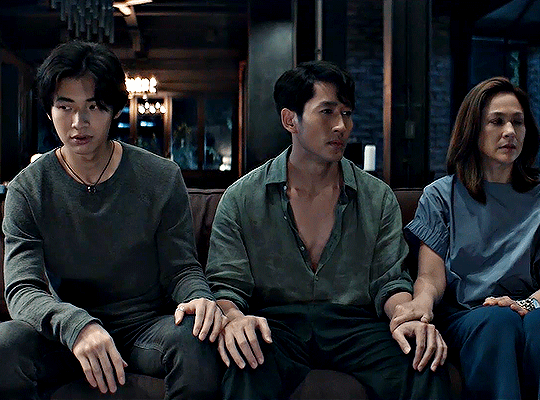
It’s winter and I’m huddled up in my house hiding from the cold weather, so obviously this is the perfect time to tackle another entry on the intergenerational family trauma challenge list. This week I finally watched 180 Degree Longitude Passes Through Us, a Thai drama about Wang, a young man just coming of age who is desperately seeking answers about his father’s death; Sasiwimol, Wang’s very complicated mother who does not want to dig up the past; Inthawut, his father’s best friend who has been hiding from it for years; and Siam, the black hole at the center of this story.
Before I dig into the trauma themes, let me just say that this show is excellent, if not for everyone. It has a very intentional style that makes it feel like a stage play—the writer is a playwright—and it’s basically eight episodes of very intense conversations. It’s not a romance and there’s an intellectualism in the writing that I found kept me at an emotional remove from the characters even as I marveled at how well crafted the dialogue is. And the dialogue is very important, which is why the translation of this drama is much stronger than we typically get from Thai productions—the words matter. It’s also loaded with visual metaphors and is all around beautiful to look at, and the three main performers are fantastic. I highly recommend it to anyone who likes theater, stories about complicated families, or beautiful and talented actors showing their work. And more than anything else, this show does incredibly strong thematic work and its messaging is on point: this is a story about how noble idiocy ruins lives.
So, with that said, onto the trauma! Spoilers ahead, and I am assuming anyone reading past this point has watched the show. Some themes you’ll see in this one: taboo, denial of queer identity, homophobia, filial piety, and lots of emotional manipulation. Shoutout to @bengiyo and @twig-tea for reading this to make sure I didn’t miss anything in this complex story.

There are two main sources of intergenerational trauma radiating down toward Wang: the absence of his father, Siam, and his intense relationship with his mercurial mother, Sasiwimol. The story is structured around Wang’s determination to seek answers about Siam—both who he was and how he died. He has grown up knowing a certain story: that his parents met and fell in love in college but divorced when he was young, that his father loved him very much despite not staying with his mother, and that his father was an alcoholic who died in a drunk driving accident. Shortly after his father’s death, his mom put him in boarding school so she could focus on her career and became a weekend parent to him—as she was not around to structure his day to day life, their relationship became more about her taking him on fun adventures and spoiling him when she had time off, treating each other as best friends instead of like a mother and son, and never talking about Siam. He has always suspected there was more to the story of his parents that he was not being told, and as he has grown up, come into his own queerness, and picked up on his mother’s casual homophobia and obsessive devotion to compulsory heteronormativity, his suspicions about the secret his mom was holding became sharper.
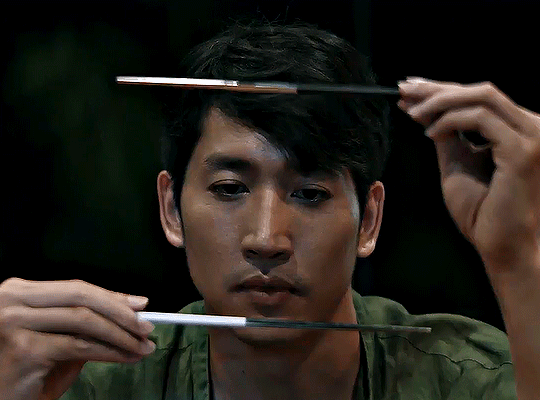
Enter Inthawut. Inthawut was Siam’s best friend, and with nothing to go on but a set of old pictures, Wang has an instinctual certainty that he is the key to the secret he’s seeking. And thus he engineers a way for he and his mom to “coincidentally” stumble onto Inthawut’s property and get invited to stay a few days in his isolated home, at which point Wang begins his campaign to figure out what the hell happened between Siam, Sasiwimol, and Inthawut at any cost.
One of the things I find most interesting about this story is how much the plot hinges on Wang going against Asian cultural norms in his pursuit of the truth. He is not respectful to his elders. He does not maintain filial piety and deference to his mother. He refuses to restrain his emotions. Instead, he is pushy and relentless and emotionally manipulative (all tricks we can plainly see he learned from Sasiwimol) and Inthawut doesn’t stand a chance against him. And so, because Wang explicitly acts against these cultural values, the truth comes out and the trauma is no longer suppressed.
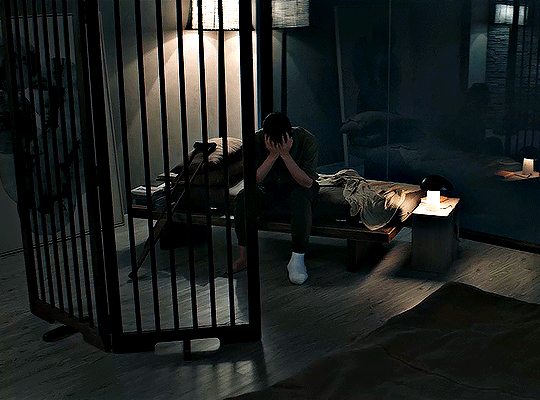
And in the end, it’s a simple, if desperately sad story: Siam and Inthawut were in love, but Inthawut was battling internalized homophobia and deep-seeded fear and so he relentlessly pushed Siam away and toward dating and then marrying their friend Sasiwimol. And when Siam, miserable in this heterosexual relationship he never actually wanted, finally snapped and confessed his true feelings, Inthawut rejected him and ran away to study abroad. Inthawut was running due to his own fear, but he also had noble notions of somehow protecting Siam from his own queerness and told himself that if he was gone, Siam would accept his heterosexual life. Of course, that did not happen, and in the fallout of this rejection Siam sank further into alcoholism and died soon after. Inthawut’s reaction was the exact worst fear of all gay people who work up the courage to confess to a friend they have developed feelings for: outright rejection, abandonment, and destruction of the relationship. And in his mind, he did this to Siam “for his own good,” a fairly textbook execution of the noble idiocy trope. In the aftermath, we see how Inthawut has isolated himself, part in penance, part in self-protection, and intellectualized his way to a romantic construction of his own cowardice that he tries to convince Wang is righteous.
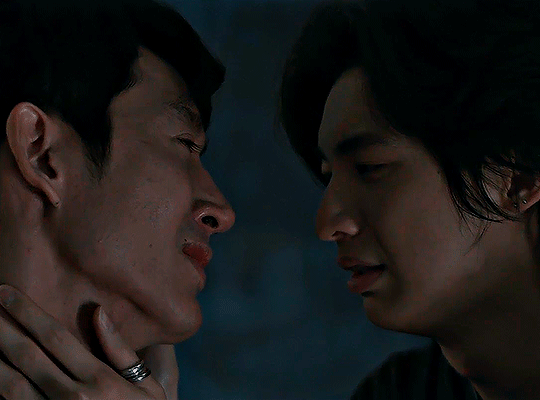
But Wang is deeply affected by how the denial of his father’s queerness ruined his life and is absolutely not having any of Inthawut’s self-denying bullshit, and this is where things get messy, as both Wang and Inthuwat seem to start seeing Wang and Siam as interchangeable and they develop an emotional entanglement that is deeply unhealthy, to say the least. Wang wants to understand Siam so badly that he starts to be him, and Inthuwat is so desperate to address his regret and shame that he starts to see Wang as Siam, as well. Wang also uses this attachment as a way to shock his mother and forcefully bring her real feelings about Siam and Inthawut to the surface. Despite Wang’s many loud protestations to the contrary, I don’t believe that he and Inthawut actually love each other. They are using each other to work out their trauma about Siam.
And they’re not the only ones! Sasiwimol seems to have her own psychological confusion about Wang as he relates to Siam, and their dynamic is very strange as a result. She refers to Wang as dua-eeng (and has taught him to do the same with her rather than calling her “mom”), a Thai endearment that literally means “self” but is often used between lovers. They have a very physically affectionate relationship that often had me grimacing in discomfort, and she clearly sees Wang as both a source of pain—because he is so like Siam—and her one source of comfort and happiness. She is a successful woman by any standard, but she’s also desperately lonely, hanging on tight to Wang as her only companion in a way that often veers into overbearing, and deeply wounded by her past with Siam and Inthawut. It was through her own friendship with Inthawut that she pursued Siam in the first place, and she clearly feels betrayed not only by Siam, but by Inthawut, both for getting in the way of her relationship with Siam and for leaving them. Her feelings about both men are complex and the story never fully spells them out, in part because Sasiwimol never does. Determinedly not thinking about what happened between them is a big part of how she copes, along with sublimating her suspicions into homophobia, which she perpetuates quite intentionally in her work via production of heterosexual romance propaganda.

Wang clearly loves his mother even as he is frustrated by her prejudices, her desire to control him, and her tendency toward emotional manipulation. He is a perceptive kid and he has studied her closely; he understands her very well and can often predict exactly how she’ll react to a situation. Which is why his decision to announce baldly to her face that he is in love with Inthawut—not only coming out as gay but declaring his intention to move out of her home and in with a man 20+ years his senior who is deeply entangled with her own trauma—felt very intentional to me. He knew what kind of reaction that would get from her, and he wanted it. And sure enough, Sasiwimol crumbles at this repetition of her trauma and the perceived disloyalty of Wang choosing Inthawut over her just as his father did. The rest of the emotion she’d been holding back comes pouring out, resulting in the three of them finally airing out everything that lies between them and everything they are feeling about the Siam-shaped hole in their lives. And once she breaks down, Wang is able to forgive her for the grievance she’s caused him and ultimately decides to remain filial and continue living with her, because he does not actually want to punish his mother for what happened to his father.

So, in the end, where did the story leave us with all this trauma? I can’t really say that any of these characters have healed, but I do think Wang kick-started that process, at least for himself. He got what he needed most out of this little scheme: deeper understanding of who his father was and why his life took such a drastic turn. He remains caught in the dysfunctional dynamic with his mother, and I’m not sure he’ll ever fully break out of it, but at least there is more honesty between them now about what they’re dancing around. She now knows he is gay and she has to accept it to keep him with her, and given that he has backed off from asking her to accept something much scarier than that, I do think she will find a way to make her peace with it. Inthawut is the character who seems to have progressed the least, standing firmly in his stasis and remaining determinedly alone with his pain, though the show leaves us with a note of ambiguity that suggests he may someday find the courage to move on.
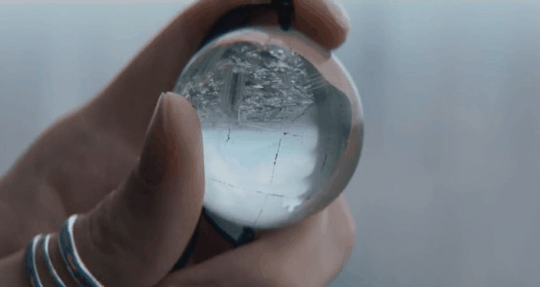
The messages of this work are clear. Internalized homophobia and denial of your own queerness are poison for your soul. Rejecting a loved one “for their own good” is an act of cowardice and selfishness, not an act of love. Hiding from and sublimating your trauma will never allow you to heal. Refusing to process your pain will only lead to you pushing it down on the next generation. Ultimately, this story told us that bravely looking ourselves and our trauma in the face and confronting our truths head on is the only way to begin to heal, and that running from them only leads to ruin.
#180 degree longitude passes through us#thai drama#intergenerational trauma challenge#shan shouts into the void
103 notes
·
View notes
Text
Turtles Catches Up With Old GMMTV: The Bad Buddy Rewatch Edition, Part 3a -- BBS and Asian Cultural Touchpoints
[What’s going on here? After joining Tumblr and discovering Thai BLs through KinnPorsche in 2022, I began watching GMMTV’s new offerings -- and realized that I had a lot of history to catch up on, to appreciate the more recent works that I was delving into. From tropes to BL frameworks, what we’re watching now hails from somewhere, and I’m learning about Thai BL's history through what I’m calling the Old GMMTV Challenge (OGMMTVC). Starting with recommendations from @absolutebl on their post regarding how GMMTV is correcting for its mistakes with its shows today, I’ve made an expansive list to get me through a condensed history of essential/classic/significant Thai BLs produced by GMMTV and many other BL studios. My watchlist, pasted below, lists what I’ve watched and what’s upcoming, along with the reviews I’ve written so far. Today, I offer the first half of the third (ha!) of five posts on Bad Buddy. I'll look today at themes that myself and fellow Asian fans of Bad Buddy have caught and related to in this wonderful show.]
Links to the BBS OGMMTVC Meta Series are here: part 1, part 2, part 3a, part 3b, and part 4
As a lifelong viewer of Asian dramas, and as an Asian-American myself, I know why I'm drawn to Asian dramas. We all have our reasons for belonging to this widespread fandom, whether you're watching queer or het Asian dramas, consuming Asian music, all of it.
What are my reasons? The first and foremost one is relatability. Especially in Asian dramas, I relate to the spoken and unspoken communication of the dramatic characters as they navigate life's highs and lows. I relate to the way Asian dramatic characters engage with their families, their partners, their children, their colleagues, the world and societies around them. I relate to the ways in which societies are drawn and constructed, to the economic and emotional pressures that characters face. As an American -- I don't fully relate to the majority of experiences that white American characters face dramatically, because I'm not a part of the majority. As an Asian? I get almost all of what Asians are going through in dramatic art (save for, say, Korean or Japanese historicals, ha — but I do indeed get Asian patriarchy and sexism).
I'm not queer -- I am a cishet Asian woman -- but what I appreciate about queer Asian media is, very often, the media's tendency to not be shy about the various and intricate ways that discrimination, sexism, trauma (intergenerational, emotional, etc.), and many more social and emotional phenomena interplay in an individual's life.
When I first watched Bad Buddy, I had the strong sense that what I was watching was incredibly relatable to much of my upbringing and life as a young adult, working out issues vis à vis my family and my eventual partner. Bad Buddy, thematically, captured a tremendous amount of the realities of everyday Asian life for young people.
Bad Buddy exists in the GMMTV bubble of No Homophobia (cc @bengiyo and @lurkingshan, as we have spoken about the GMMTV bubble). However, what Bad Buddy didn't shy away from were explorations of many other social/emotional/cultural themes and frameworks of everyday life, from sexism, to youth bias, to boundaries and enmeshment, and many, many more.
I wrote in my first-ever Bad Buddy thesis that the framework of intergenerational trauma was the main theme I identified -- and identified with -- in the show. But, as I was contemplating writing this series of Bad Buddy meta posts, I wanted to know: what did my fellow Asians pick up in this show that they saw, and that they related to? In other words: what makes Bad Buddy particularly special to Asian fans of the show?
So, I did a thing. I gathered together a few BBS Asian stans, like myself, for a lengthy (and still ongoing!) discussion about what we related to in Bad Buddy. I want to thank, from the bottom of my heart, @telomeke, @grapejuicegay, @recentadultburnout, @neuroticbookworm, and @lurkingshan (who's not Asian, but has Asian relatives, and gets us!) for being up for creating a spontaneous mini-village together to talk Bad Buddy and its inherent Asianness.
It sounds redundant to identify Bad Buddy, a show made by Thais and set in Thailand, as an "Asian" or "Thai" show. It's definitely not a show that steps back to take a look at itself and say, "oh hey, this is really 'Thai,' what we're doing here." When I asked @recentadultburnout directly about what they might have identified as uniquely Thai about Bad Buddy, RAB thought about it and said -- maybe Pat's ranak ek (Thai xylophone). Other shows of Aof Noppharnach's, including He's Coming To Me, Moonlight Chicken, and even the start of Last Twilight, highlight many facets of Thai life, from the spiritual to the everyday-cultural (even Gay OK Bangkok does this a bit, too). But Bad Buddy doesn't really go there by way of overt symbolism and/or specifically Thai spiritual/cultural practice.
The Asianness of Bad Buddy is far more inherent. It is rooted and coded in the way people interact with each other.
An overt example occurs in episode 10, when Dissaya confronts Ming in the Jindapat home, and announces that she will reveal Ming's secret, dropping the effort she has made her entire life to "save face" -- her reputation AND Ming's reputation.
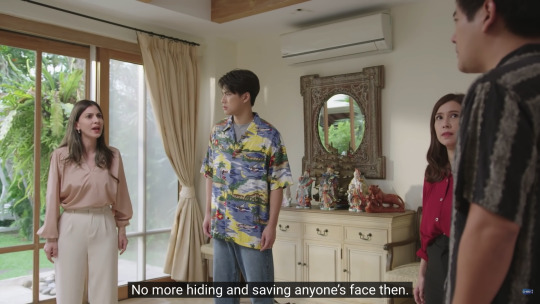
During my first Bad Buddy rewatch, I was so moved in fury by this scene that I had to blog about it as if I had never seen it before. There's so much encapsulated in this moment: the pressure that Dissaya has put on herself to keep the embarrassing secret that she lost a scholarship; the effort she made to keep Ming's theft of the scholarship a secret, to save his face, and the secrets she kept from Pran to save her face, and to keep up the façade of rivalry between the Jindapats and the Siridechawats. She was letting a whole hell of a lot loose in this moment, because the eternal pressure of saving face in Asian societies is, frankly, never-ending.
"Saving face" is an incredibly important notion in many Asian collectivist cultures. Saving face is about an individual or a family projecting an image of calm, cool collectedness and success, in order to not make waves within a collectivist society for any reason. If you are not working to seem like you are going with the flow of life, if you're not keeping up with the Joneses, the Kardashians, whoever -- you are not saving face. If you are in poverty, and are projecting an image of poverty, instead of pretending to be more wealthy than you are -- you are not saving your face or your family's face. If you allow yourself to get publicly defeated -- you are not saving face. Dissaya gave up a lot of her hard-earned reputation in the moment she confessed the truth in front of Pat and Pat's mother.
My Asian friends and I can click wordlessly into understanding the pressure of saving face; say that I didn't get good grades in school? I wouldn't be saving my parents' face. This kind of pressure to keep up with particular social dynamics within and external to family, within Asian societies, is a neverending drumbeat of pressure.
Besides saving face, there are many other Asian cultural touchpoints that were contained within Bad Buddy that my fellow Asian BBS stans and I noted. They include:
1) intergenerational/inherited trauma,
2) the unique nature of secret-keeping in Asian cultures/societies,
3) enmeshed family boundaries,
4) setting up children to compete against each other for the sake of familial pride,
5) patriarchy, sexism, and the reversal of sexism among next generations,
6) the inset/assumed roles of family members based on patriarchy and elder respect,
7) Assumed community within and external to one's family, usually based on where you live and where you go to school,
8) How one's identity is defined based on patriarchy and individualist vs. collectivist cultures,
9) How various cultures within an Asian nation live peacefully (or not) together (for example, what makes Pat and Pran different by way of Pat's Thai-Chinese heritage vs. Pran's ethnic Thai heritage),
and many, many more.
It'll be impossible, even over two posts, to analyze all of these cultural touchpoints, but a few of them engendered quite a bit of conversation among the BBS mini-village that I want to highlight. In this post, I'll focus on the continuation of my first BBS thesis on intergenerational/inherited trauma, the nature of secret-keeping in Asian societies, and will return briefly to the touchpoint of saving face.
One of the most devastating scenes for me in Bad Buddy is in my favorite episode, episode 10, when Pat (after he's learned, throughout the episode, of the extent of the lies that his and Pran's family have shared with their children) confronts his father about his father's demands to literally control Pat's emotions, the way in which Pat related to other people -- specifically Pran. Pat sums up a lifetime's worth of control in one sentence.
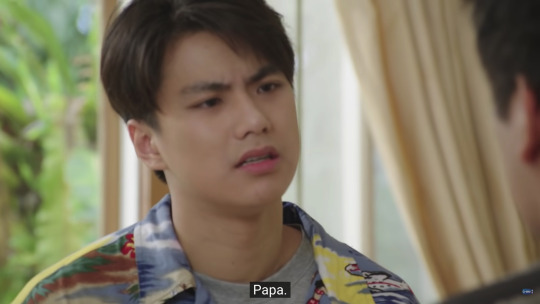
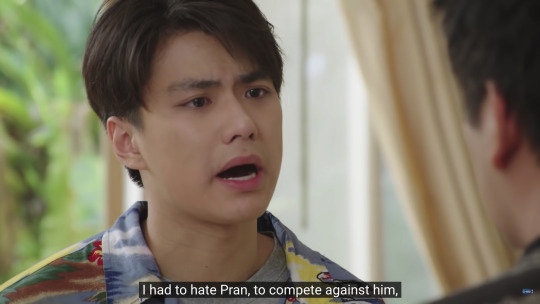
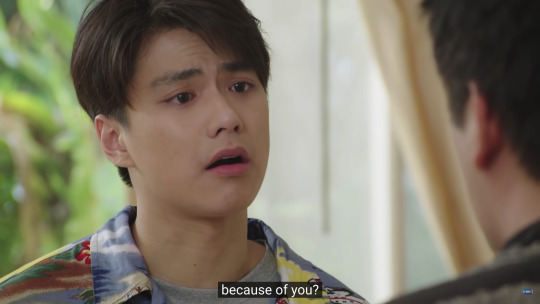
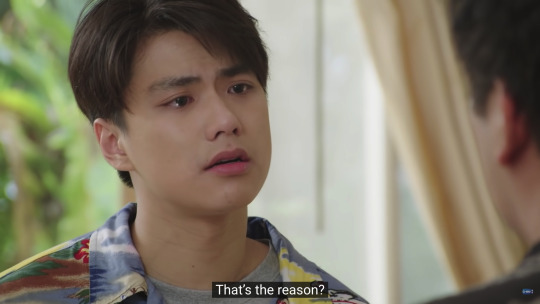
@telomeke noted in our ongoing group conversation that this notion of inherited trauma vis à vis Ming is particularly present in Asian societies, not just by way of familial expectation that we, as Asians, embody it and "take it" throughout our generations, as Pat realized up above -- but that ALL family members present are responsible for playing their roles within the framework of the inherited trauma. @telomeke noted in particular that exactly what Pat was doing to hate Pran, FOR his father? That was what Ming HAD to do for MING'S dad, when Ming schemed to get the scholarship from Dissaya. AND, Pat's mother, in consoling Pat, had to play the role of explainer -- which, as we know now, Pat ran away from to meet his beloved Pran on the rooftop before running away to the eco-village.
Pat running away from that moment? That was a huge symbol of the breaking of the inherited trauma that was given unto him by his parents both.
(@telomeke has actually written about their theory about how the Jindapats and Siridechawats ended up living next door to each other -- which seems SO STRANGE on the surface, consider Ming's and Dissaya's boiling hatred for each other -- and the theory links nicely within the framework of inherited trauma. Tel theorizes that Ming's father or grandfather may have actually gifted the house to Dissaya's family as a means of apologizing for Ming's deceit. In which case: the presence of the Siridechawats is a reminder, on an everyday basis, of Ming's folly to steal from Dissaya, which may explain why Ming in particular went so hard on Pat to triumph daily over Pran.)
We as a group unwound quite a bit on the nature of secret-keeping in Asian cultures. We know Bad Buddy relies on this cultural touchpoint at the end of the series: Pran and Pat have a full-fledged and committed relationship as a transparent secret, under the noses of Pat's and Pran's parents.
Secret-keeping....oh, man. I could not have lived a fully authentic life in America if I didn't keep a million secrets from my family while I was living out my own independent choices. I actually, literally, could not have gotten married, because the rule of my household was that I wouldn't date. I would just... get engaged. So I'd get engaged through, what, magic? Match-making? No: I'd have to find my partner through my own battle of social and familial conventions, literally against my family, to get to where I wanted to be in life, which was (gasp) married.
@neuroticbookworm illuminated more on this particularly from our shared Indian lens. She wrote,
Keeping your relationship secret from parents is sooooo ridiculously common in India (and I'm sure we can extrapolate to other Asian countries like Thailand). And the justification the children give themselves is always rooted in how they have a "duty" towards their parents, and that they will reveal their relationship after they have fulfilled their duties.
God, I LOVED that NBW brought up "duty" in this conversation. Because! Assumed within the coded language from Asian parents to children, and vice versa, is a sense that children MUST follow the dictates of their parents. 100%, full-stop.
The duties that NBW clarified in this particular conversation specified life demarcations such as "[w]hen I graduate, I'll tell my parents about my partner," and "[w]hen I graduate and get a job and can financially support myself in life, I'll tell my parents about my partner."
What's coded in these statements is a fear that the children will have to reveal to their parents that they were disobedient in the rules their parents set, that no dating shall occur until the time at which the parents rule it's okay. And at least within Indian frameworks, that period of it being "okay" is, more often than not, the period in which arranged matches are examined. Because, yes, that's still the rule in the high majority of Indian culture.
The revelation of that disobedience? That's bad-news bears. It indicates... everything: a lack of loyalty to the family; a lack of understanding the meaning of a child's role to listen to the parents as the parents are elders and therefore are the moral authority of the household; a lack of self-control (which is a huge deal -- that relates to saving face on behalf of the family); a lack of understanding the morals and ethics of saving oneself, in love and sex, before marriage, etc. Even if a family seems fully progressive on the outside, as an Asian, I'm conditioned to question that progressiveness -- as parents may hold different standards of acceptance for their children vs. other young people.
@telomeke expanded on disobedience for us -- connecting it back to the very important notion of "saving face."
I think there's something quite related to secret-keeping, but it's also to do with the ability of Asians, but also human beings in general, of being able to live with duality in life... and secret-keeping is part of it. This also ties in to the East and Southeast Asian preoccupation with the concept of "saving face" [as noted above]. A lot of families are able to live with the knowledge of dirty secrets, unsavory truths, as long as it's not brought into the light and confronted. I'm constantly reminded of this whenever I rewatch BBS Ep. 12 because it's clear both Ming and Dissaya KNOW their sons are in a relationship but it's not overtly admitted. In that way they (and more Ming I suppose) get to "save face" and not have to deal with the truth that their sons are being disobedient, consorting with the enemy, and because it's not in the open -- there is no dishonor brought to the family and to the elders.
God, I love the way Tel put this. That disobedience on the part of Pran and Pat would actually bring dishonor to their families -- because their families have put SO MUCH EFFORT into building their public AND private enmity their entire lives! It affected Chai's relationship with the families as an employee of both families. EVERYONE AT PAT'S AND PRAN'S SCHOOLS knew the guys were the "legendary rivals." And, of course, by being in rival faculties at the same university, the boys could continue this public enmity as well -- keeping up with the roles that were literally assigned to them by their parents.
If the boys disobeyed, they would bring dishonor to their families. Think about that -- and connect that with the heaviness that Pran walked away with after the rooftop kiss in episode 5, AND the weight of Pran's breakdown at the end of episode 10, when Pat assured him that they would run away together.
No matter what a Western viewer (and maybe even Asian viewers, wanting to see a dismantling of these paradigms) would want Pat and Pran to have by way of full openness of their relationships with everyone in their lives (because, in individualistic cultures, that self-driven openness is a given), Pran and Pat themselves knew that that couldn't be their reality vis à vis the social worlds they belonged to. So they kept their relationship a secret, in the end.
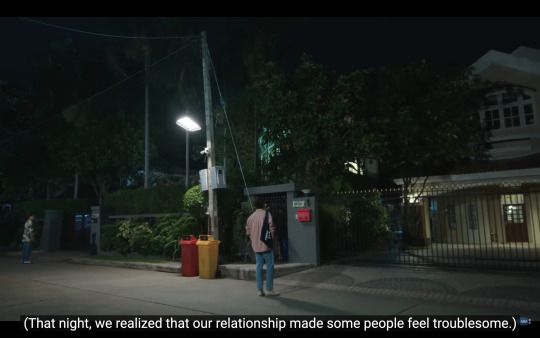
The secret that Pran and Pat keep about their relationship is strategic. It's certainly also a stress point: an older Pat asks an older Pran, at the end of episode 12, if he'll ever be able to walk through the front door of the Siridechawat house.
But this is the compromise -- within the larger-scale culture of secret-keeping in Asian societies, AND the private frameworks of the enmity that Dissaya and Ming established between themselves and their families years and years prior -- that will work best for Pat and Pran to preserve the sanctity of their relationship, which I talked about in part 2 of this meta series.
Pran and Pat do not have to publicly appear disobedient to the demands and pressures of their families. They do not have to make their families engage with each other. They do not have to make their families confront the mistakes that their parents made earlier in their lives. They can protect their families from their private and public follies. They can help their families keep and save face. And by doing all that? They can prevent their relationship from being threatened.
I feel this very deeply in my heart as an Asian-American. For the sake of my American spouse, I wanted to protect him from a lot of these pressures, and so I insisted on keeping a lot of our relationship secret from my folks. If I demanded full-blown, public acceptance from my parents? If I brought my "boyfriend" to parties, and introduced him as such with aunties and uncles -- especially if it wasn't indicated that we'd be permanent one day? Damn. No. I'd be embarrassing my folks, with the aunties and uncles saying to my folks, "dang, you can't control your daughter, huh? You let her do what she wants." That would mean my parents would lose face over their ability to control the lives of their children, and that's no bueno in our cultural terms. It would be on ME, as THEIR child, to uphold THEIR ability to save face, as much as its their own work.
Dissaya refers DIRECTLY to Pran doing this FOR HER when, in episode 10, she asks him, "did you forget to save my reputation?" It's brutal, daily work. And Pran goes BACK to keeping secrets in the end, because it would have been impossible, ultimately, for Dissaya to save face, AND for Pran to save Dissaya's reputation/face, if Pran were out with his relationship with Pat, thus proving his disobedience. It would be -- JUST -- better to keep the secret for all those involved.
As this post has gotten long, I'm going to continue talking more about these touchpoints in a second post. I'm driven to talk about this because I think much of the Western fandom might miss what us Asians are reading into shows like Bad Buddy through this coded language and engagement. I very much posit that Bad Buddy -- while it is first and foremost a queer show, made by queer Asians, about queer young men -- is so relatable to so many of us because we've faced similar struggles of survival, and we've faced threats to the sanctity of the love we have for other people by way of needed to fit into the roles set before us by previous generations.
So! With that, thank you for reading, and see you tomorrow, when I focus on competition, enmeshed family boundaries, patriarchy and sexism in Bad Buddy, and more if I can fit it in!
(Tagging @dribs-and-drabbles, @solitaryandwandering, and @wen-kexing-apologist by request! If you'd like to be tagged, please let me know!)
[Alright! Stay tuned for more, many more ruminations from the BBS Asian station tomorrow!
Here's the status of the Old GMMTV Challenge watchlist. Tumblr's web editor loves to jack with this list, so mosey on over to this link for the very latest version!
1) The Love of Siam (2007) (movie) (review here)
2) My Bromance (2014) (movie) (review here)
3) Love Sick and Love Sick 2 (2014 and 2015) (review here)
4) Gay OK Bangkok Season 1 (2016) (a non-BL queer series directed by Jojo Tichakorn and written by Aof Noppharnach) (review here)
5) Make It Right (2016) (review here)
6) SOTUS (2016-2017) (review here)
7) Gay OK Bangkok Season 2 (2017) (a non-BL queer series directed by Jojo Tichakorn and written by Aof Noppharnach) (review here)
8) Make It Right 2 (2017) (review here)
9) Together With Me (2017) (review here)
10) SOTUS S/Our Skyy x SOTUS (2017-2018) (review here)
11) Love By Chance (2018) (review here)
12) Kiss Me Again: PeteKao cuts (2018) (no review)
13) He’s Coming To Me (2019) (review here)
14) Dark Blue Kiss (2019) and Our Skyy x Kiss Me Again (2018) (review here)
15) TharnType (2019-2020) (review here)
16) Senior Secret Love: Puppy Honey (OffGun BL cuts) (2016 and 2017) (no review)
17) Theory of Love (2019) (review here)
18) 3 Will Be Free (2019) (a non-BL and an important harbinger of things to come in 2019 and beyond re: Jojo Tichakorn pushing queer content in non-BLs) (review here)
19) Dew the Movie (2019) (review here)
20) Until We Meet Again (2019-2020) (review here) (and notes on my UWMA rewatch here)
21) 2gether (2020) and Still 2gether (2020) (review here)
22) I Told Sunset About You (2020) (review here)
23) YYY (2020, out of chronological order) (review here)
24) Manner of Death (2020-2021) (not a true BL, but a MaxTul queer/gay romance set within a genre-based show that likely influenced Not Me and KinnPorsche) (review here)
25) A Tale of Thousand Stars (2021) (review here)
26) A Tale of Thousand Stars (2021) OGMMTVC Fastest Rewatch Known To Humankind For The Sake Of Rewatching Our Skyy 2 x BBS x ATOTS (re-review here)
27) Lovely Writer (2021) (review here)
28) Last Twilight in Phuket (2021) (the mini-special before IPYTM) (review here)
29) I Promised You the Moon (2021) (review here)
30) Not Me (2021-2022) (review here)
31) Bad Buddy (2021-2022) (thesis here)
32) 55:15 Never Too Late (2021-2022) (not a BL, but a GMMTV drama that features a macro BL storyline about shipper culture and the BL industry) (review here)
33) Bad Buddy (2021-2022) and Our Skyy 2 x BBS x ATOTS (2023) OGMMTVC Rewatch (The BBS OGMMTVC Meta Series is ongoing: preamble here, part 1 here, part 2 here, more reviews to come)
34) Secret Crush On You (2022) (on pause for La Pluie)
35) KinnPorsche (2022) (tag here)
36) KinnPorsche (2022) OGMMTVC Fastest Rewatch Known To Humankind For the Sake of Re-Analyzing the KP Cultural Zeitgeist
37) The Eclipse (2022) (tag here)
38) GAP (2022-2023) (Thailand’s first GL)
39) My School President (2022-2023) and Our Skyy 2 x My School President (2023)
40) Moonlight Chicken (2023) (tag here)
41) Bed Friend (2023) (tag here)
42) Be My Favorite (2023) (tag here)
43) Wedding Plan (2023)
44) Only Friends (2023) (tag here)]
#bad buddy#bad buddy meta#bad buddy the series#bad buddy the series meta#backaof noppharnach#aof noppharnach#ohmnanon#ohm pawat#nanon korapat#patpran#pat x pran#pran x pat#the bbs ogmmtvc meta series#turtles catches up with old gmmtv#the old gmmtv challenge#ogmmtvc#turtles catches up with thai BLs#turtles catches up with the essential BLs#asian intergenerational trauma#intergenerational trauma#asian themes in bad buddy#saving face in asian cultures#asian cultural touchpoints in bad buddy
63 notes
·
View notes
Text
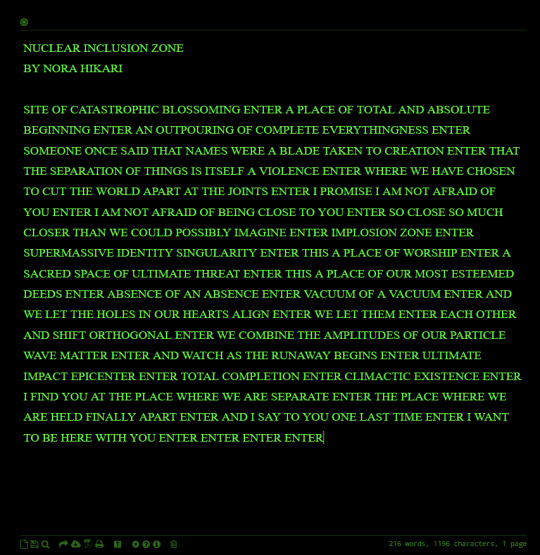
IMAGINE THE EXACT OPPOSITE OF A NUCLEAR EXPLOSION
#personal post#poetry#my poetry#today is not a great day for someone with intergenerational nuclear trauma#christopher nolan k*ll yourself challenge
32 notes
·
View notes
Text
Shadow Work Questions for BIPOC
✨How have societal expectations and stereotypes influenced your self-perception?
✨ In what ways have you internalized historical or systemic injustices, and how does it manifest in your daily life?
✨ Are there aspects of your identity or experiences that you may be avoiding or suppressing?
✨ How has the concept of “respectability politics” shaped your behavior and choices?
✨ Reflect on instances where you may have internalized prejudices or biases. How do they impact your relationships and worldview?
✨ How do you navigate code-switching, and what impact does it have on your authenticity?
✨ Consider experiences of intergenerational trauma within your family. What are its influences on your beliefs and behaviors?
✨ Reflect on any internalized messages about success, worth, and beauty. How do they shape your goals and self-esteem.
✨ Are there parts of your heritage or cultural identity that you may have neglected or rejected? Why?
✨ How do you handle and express anger, particularly in response to systemic issues or personal challenges?
“I am powerful. I am valuable. I am a force for positive change.”
#pagan#spiritual healing#spirituality#healing#nature#self care#shadow work#shadowwork#bipoc#black americans#black witches#witches of color#black girl magic#ancestors#black pagans#spiritual practitioner#holistic practitioner#black spirituality#spiritual growth
89 notes
·
View notes
Note
hello !!
i was wondering, do you know any other characters like aang from other shows/movies/books? or maybe, just his theme of radical kindness appearing in other stories?
i've been missing aang, and it would be nice to find other representations of such a fun and warm personality like his.
ps.: your blog is like, fantastic. truly.
🥰🥰🥰🥰 This is the best ask I’ve ever received!!! Depictions of radical kindness in media is a special interest of mine—not exaggerating. So I’ve done my best to make a list of rec’s, just tv, from most formally similar to ATLA to least, with a short description for each.
1. Fruits Basket (2019)
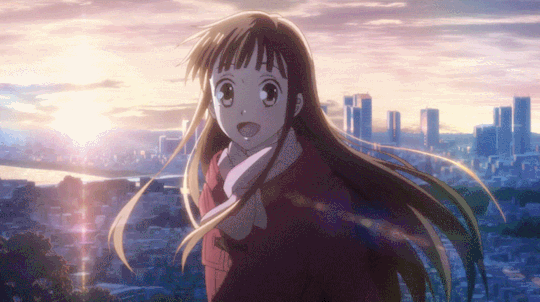
"My mom told me, it's better to trust people than to doubt them. She said that people aren't born with kind hearts. When we're born, all we have are desires for food and material things. Selfish instincts, I guess. But she said that kindness is something that grows inside of each person's body, but it's up to us to nurture that kindness in our hearts. That's why kindness is different for every person."
An anime orphan whose established memory of the kindness by which her family raised her ends up transforming and liberating a whole clan from an intergenerational curse that enforced an abusive hierarchy all within a show that has a deeply queer subtext, beautifully complex plotting and character development that due to its zen influence refuses to demonize anyone or any perspective wholly, AND a straight romance you can actually root for!? Nothing comes closer to ATLA thematically than this show. While the lead Tohru Honda is the biggest representative of radical kindness, the character of Momiji Sohma with his complex purity, idealism, and gender performance is one of the closest you'll find to Aang in any media.
2. Mob Psycho 100 (2016-2023)

"The truth behind one's charm is kindness. Just be a good person, that's all."
Mob Psycho 100 explores a core tenant of ATLA's critique of imperialism and power: greatness and perfection are overrated. They both ask the question about what to do for the world with one's gifts if that's the case. How can one be both normal and prodigious at the same time? The satirical comedy and style of this anime, which deconstruct a lot of the shonen genre tropes, are pretty distinct from ATLA, but when ATLA arrived on the airwaves, it was a pretty massive break from tradition in Western animation, and for both of these series, that difference of style is tied to the message of the show about the experience and acceptance of difference.
3. Natsume's Book of Friends (2012-present)

"As I encountered kindness, I wanted to be kind myself."
The anime, Natsume's Book of Friends and ATLA both depict the challenge and necessity of facing abandonment, loss, and a deep-seated loneliness with kindness and gratitude despite the persistence of grief. Both take a deeply spiritual view--even a responsibility--of this experience that demands a compassion for all beings including those who intend to do harm. Natsume, an orphan shuffled between houses who is one of the few people who can see spirits called youkai, inherits his maligned grandmother's book of yokai names, becoming a target for them in the process. He hides all of this from everyone in his life, and even five season in, still has trouble admitting to the one person who understands him when he is struggling and needs help. The gentle and light tone papers over a profoundly honest representation of attachment trauma and the wisdom of compassion that develops as a tool to cope with it.
4. Hunter x Hunter (2011-2014)
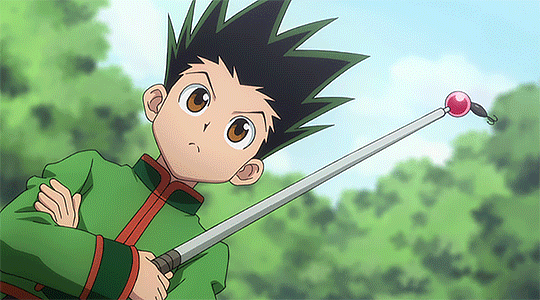
"You can do whatever you want to hide your feeling. You still have a heart."
If you think that "Radical Kindness" is by definition non-violent, then this show is either not for you or going to change your mind. Gon, the protagonist of HxH, like Momiji mentioned in Fruits Basket, is another rare character whose naivete and optimism are treated with respect. He is allowed to suffer, to be wrong, to be stupid, and to inspire others away from their own cynicism with the persistence of his beliefs nevertheless. But HxH is a show that integrates the most violent aspects of the world (organized crime, capitalistic competition and privileging, state-sanctioned brutality, pure sadism) with its examination of human potential for goodness. And even within a list of shows deeply inspired by spirituality and religions, this show is abundant with religious references as it seeks out meaning, balance, and an ethic for modern experience. On top of that, it ranks with ATLA for the depth and relevance of its magic system to its themes, plus its got gay subtext out the wazoo!
5. Mushishi (2005-2014)

“Make sure to remember, every person and place has a right to exist. It is true for you too, the entire world, as a whole, is your home."
Elegaic, episodic, compassionate, and strange, with some of the best short story-telling of all time, Mushishi is the story of a medicine-man who travels the Japanese countryside helping people deal with the spirits that accompany the little trials and tragedies of life that cling to our minds long after they're passed. The protagonist, Gingko, and the show itself takes the approach of restraint to observe these problems fully and come to a conclusion that's taoist in its balance and acceptance of reality--"Eyes unclouded by hate" as Miyazaki/Gaiman would have it. Each episode is like a therapy session arguing for you to choose to live even as the heaviest burdens sit on your chest.
6. Reservation Dogs (2021-2023)
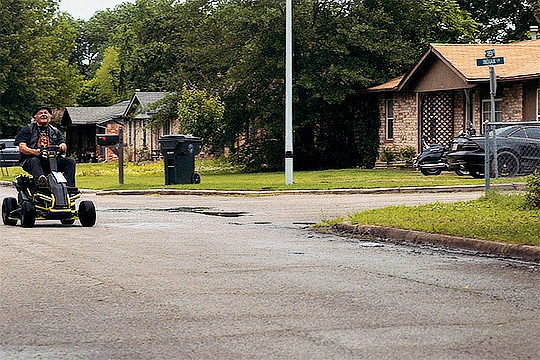
"See...love doesn't have to be received, it can just be."
We're finally out of the animes, and moving away from the zen and shinto approach into some other options. Reservation Dogs' indigenous humanism was groundbreaking, bringing in distinctly modern American realities (with the kind of true-to-life details only a an on-location shoot could offer) with Native beliefs about ancestry, community, and connection to the land, while rarely feeling preachy. Instead, it's just fucking hilarious and casually heartbreaking. Four friends on the edge of graduating high school on a reservation in Oklahoma try to figure out what to do with their lives after their plans to go to California get abruptly messed up. Radical kindness as a concept often gets focused on accepting the enemy but what about accepting the weird stoner uncle who farts all the time and won't talk about his years in the army. I think that might be a more important goal of radical kindness, in truth, if we are being asked to look and accept reality for what it is, because growing comfortable with disappointment and the mundane let's us live without the relentless striving that drives perfectionism.
7. Skam (2015-2017)
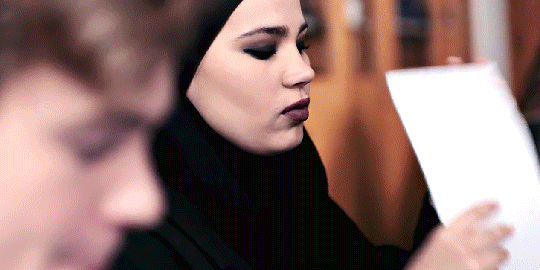
"The second you start looking for hate, you find it. And when you find hate, you start hating."
A Norwegian teen drama that understood internet culture better than any show before or since, four season-long romance plots better than any romance film from that decade, and a masterfully constructed exhortation about leaning into failures of connection to build deeper compassion rather than demonize another person or group. Each season focused on a specific character within a high-school friend group, emphasizing the limited scope of subjective experience, and had them confront the challenges of opening up to others fully. And even when they return into the scenes with new protagonists, their lives weren't sorted perfectly, reflecting how resolving a single romantic plot point would not resolve life. The impact of this low-budget public-television web series (!!!) will be felt for years (it's already been referenced by Netflix juggernauts like Sex Education and Young Royals), but we're not likely to see something that juggles political themes, heartfelt characterization, realistic dialogue, and meta-commentary (it flashed its own hater and fan comments across the screen in the last episode!!) in such a obsession-inducing package anytime soon.
7. Boys Like Boys (2023)
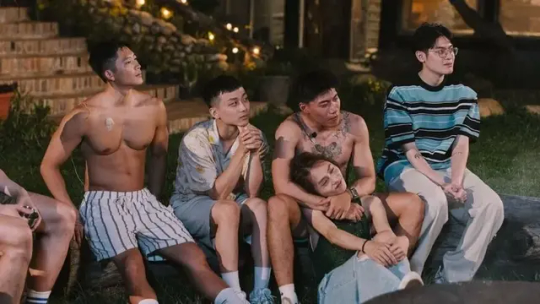
"Because I have always been someone who hates myself, I don't have the courage to face it. Running away is my only option...What if I give myself one more chance to be brave?"
So how can a reality show make it onto a list of radically kind tv series, especially a dating show!? Well, when that reality dating show casts people who radiate warmth, vulnerability, and respect and seem to have the kind of chemistry that most scripted shows can't even manage, it's a good start. But then, when they elevate that cast with a format that addresses the cruelty of dating, elimination formats, and broader societal exclusion (an important consideration for a gay dating show), it offers a new model for future shows. Boys Like Boys did this when mid-season (spoiler alert) they had contestants vote out a contestant, only to provide the contestants with a vote in which they could retain a contestant who they didn't want to leave. In fact, many of the contestants asked if they could abstain from making a vote that would eliminate a constestant and were allowed to. The final result left one contestant, Jia-Hang, up for elimination--he had voted for himself to be eliminated, and many contestants, recognizing his reticence to continue on the program, didn't want to force him against his will to stay. Then, looking around at nearly the whole cast sobbing, even apologizing to him for not providing him enough support, Jia-Hang chooses to stay on. This is just one of many heart-warming authentic moments in the show that illustrate the vital influence of kindness to impact the trajectory of our hearts.
8. Joe Pera Talks With You (2018-2021)
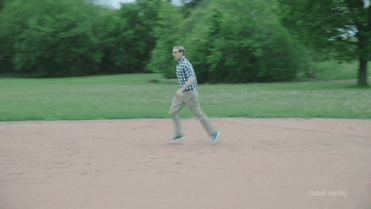
"I can help you reach things. I can tend the garden. The different hours we keep are a good thing. And when they overlap, I can offer companionship and entertainment."
So much has been written about this show's groundbreaking kind approach, I'm going to quote instead: "It can be difficult to convey how a TV show airing on Cartoon Network’s provocative nighttime programming block Adult Swim can evoke almost nostalgic feelings of kind-heartedness. The premise of Joe Pera Talks With You is so simple as to almost be beside the point: Comedian Joe Pera plays a lightly fictionalized version of himself as a sweet Michigander, a middle-school chorus teacher with small and specific passions. Joe likes breakfast food, obscure trivia, beans, trips to the grocery store, and his grandma. He greets every day with a contented smile, stands beneath a pale blue sky, packs a balanced lunch that contains no surprises. (A turkey sandwich with cheese and a tomato, a banana, some trail mix, and as a treat, some cookies.) Joe, more than anything, is satisfied. His greatest joy is sharing these small pleasures with you, the viewer who exists on the other side of the fourth wall he has cleanly dismantled, often speaking quietly to the camera like he’s sharing a secret, just between you two. That he’s talking “with” and not “to” you is a crucial distinction in the show’s title: Joe never lectures nor rhapsodizes. Instead, he waxes poetic about what he loves and who he cares for and how he leads his life, telling his stories from a vulnerable position of welcoming you into his daily existence.” --“A Great Comedy About Being Good,” Allegra Frank for Vox
9. Anne with an E (2017-2019)

"Her life was not short on challenges, and still she held no grudges, believing instead that grace is perennial like the green, green grass."
While maligned for not being the 1980s version, this Netflix adaptation of Anne of Green Gables takes what many have read as an autistic subtext and made it text, giving Anne a performative quality that pushes a lot of the audience into the same irritation that the characters of Avonlea feel for Anne at first, and, thus, requires its audience to persevere toward the same kindness that Anne inspires in her adoptive mother figure, Marilla, among others, which is much more rewarding than simply identifying with Anne right away. In so doing, it enhances the development of its broader approach to acceptance--an approach in its insistence on the requirement of a community of kindredness (see Sebastian's excitement at finding out about the black community in "The Bog") that is much more rigorous than many other shows will cop to. Expanding far beyond literal adaptation into queer, black, and indigenous characters, without disguising history or disparaging the thematic seed of grace at the heart of the novels, Anne with an E imagines what it meant and what it might still mean to build real joyful community with others through kindness.
10. Little Bear (1995-2003)

"Interesting."
A childhood favorite that disguised in its simplicity a wide-openness to the world and an acceptance of different natures. While most child shows emphasize kindness, few do so with as much patience, wonder, and generosity extended to its viewers. Little Bear is a curious kid who goes on adventures in the woods around his house that can turn into games or small imagined experiences. He is sometimes with his friends Cat, Duck, Hen, Owl, and Emily, whose personalities, along with Little Bear's, bring about small tensions in their games that ultimately resolve, if not independently, then with the help of Mother Bear or Father Bear, who give each other knowing glances about the expected childhood behaviors. This is the first show that initially taught me to observe things while withholding my judgment, that first step of radical kindness.
12. The Andy Griffith Show (1960-1968)
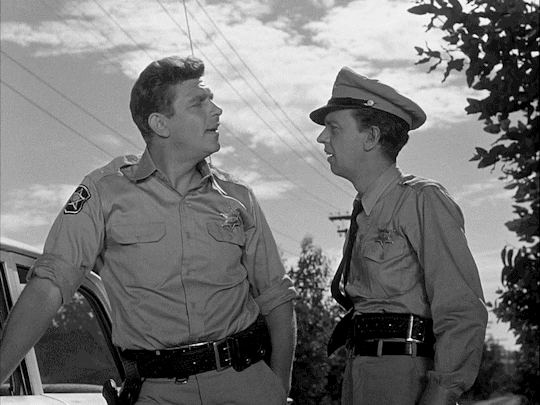
"The key to happiness is finding joy in the simple things."
One really old and somewhat controversial throwback for my last entry. If you have concerns about a sheriff character representing radical kindness, I would encourage you to start with the third episode of season 3 where Andy, the sheriff in question, has to explain to the new mayor why he doesn't carry a gun and lets prisoners go to gather their crops. There have been some fantastic pieces written about the complexities of this show's bucolic fantasy and Southerners (of all races) attachment to it, but they all acknowledge a type of humanistic and deceptively simple virtue found in Mayberry that audiences long to witness, if not emulate themselves. It's a morality that resists the "hyperactive zealotry" and bureaucracy that the show satirizes through Barney Fife (along with guest characters like the new mayor) and instead emphasizes the understanding that one can have for each individual and the trickstery middle paths that one can find to address conflict.
#sorry this took so long to respond to!#honorable mentions include Hey Arnold! & The Good Place & Friday Night Lights & S1 of Ted Lasso (but only S1 lol)#atla#kindness prevails#likealittleheartbreat recommends#fruits basket#mushishi#natsume yuujinchou#hxh#andy griffith#joe pera talks with you#reservation dogs#little bear#skam#awae#boys like boys#mp100
23 notes
·
View notes
Text
Honouring Truth and Reconciliation Day: Remembering the Importance of Orange Shirt Day
Shaina Tranquilino
September 30, 2023

In recent years, there has been a growing recognition of the importance of truth and reconciliation in acknowledging and healing the wounds caused by historical injustices. Canada's Truth and Reconciliation Day, recognized on September 30th annually, serves as a crucial reminder that understanding our past is essential for building a more inclusive and harmonious future. In conjunction with this day, Orange Shirt Day stands as a poignant symbol of remembrance and reflection concerning the devastating impacts of residential schools. This blog post aims to shed light on both events' significance and highlight why they deserve our attention.
1. Understanding Truth and Reconciliation:
Truth and Reconciliation Day holds immense value as it acknowledges the painful history experienced by Indigenous peoples in Canada due to colonization policies such as the Indian Residential Schools system. The objective is not only to remember but also to foster an environment where dialogue, empathy, and understanding can flourish between Indigenous communities and non-Indigenous Canadians.
2. Recognizing Orange Shirt Day:
Orange Shirt Day complements Truth and Reconciliation Day by focusing specifically on raising awareness about residential schools' traumatic legacy. Initiated by Phyllis Webstad's story when her new orange shirt was taken from her upon arrival at a residential school, this day reminds us of the countless children who were stripped of their culture, language, identity, dignity, and familial bonds.
3. Learning Lessons From Our Past:
By commemorating these days collectively, we acknowledge that recognizing historical wrongs paves the way for healing intergenerational trauma. It prompts us to reflect on how similar systemic injustices persist today within various societal structures—education systems, healthcare disparities, judicial processes—among others.
4. Promoting Education & Awareness:
Educating ourselves about Indigenous history should extend beyond one designated day or month; however, Truth and Reconciliation Day provides an opportunity for all Canadians to engage in learning about the diverse cultures, traditions, and contributions of Indigenous peoples. It encourages us to become active participants in reconciliation efforts by challenging stereotypes and fostering inclusive spaces.
5. Fostering Reconciliation:
Reconciliation is a journey that involves listening, understanding, respect, and dismantling systemic barriers. On this day, let's strive for meaningful reconciliation by recognizing the rights of Indigenous peoples and promoting their self-determination while building bridges between communities based on mutual trust and understanding.
Truth and Reconciliation Day signifies an essential step towards healing historical wounds, acknowledging past injustices, and promoting unity among Indigenous and non-Indigenous communities. Together with Orange Shirt Day, it reminds us that we must confront uncomfortable truths if we genuinely seek reconciliation in our society. Let us embrace these days as opportunities to learn from our history, amplify Indigenous voices, work towards positive change, and build a future where cultural diversity thrives within an atmosphere of truth, compassion, justice, and respect for all.
#truth and reconciliation day#orange shirt day#every child matters#end colonialism#healing generations#honouring survivors#indigenous rights#residential school legacy#remembering the children#reconciliation journey#justice for all
48 notes
·
View notes
Note
Just out of curiosity but do you read/ hc pietro as neurodivergent? I know it’s a popular hc among fans and there’s certainly some moments that lend to that interpretation (plus I see a bit of myself and my brother in him so personally I hc he has mild autism) but I was wondering if you had any of your own thoughts on it, or for Wanda for that matter?
Yes, but it's complicated. Pietro and Wanda are both characters who spend a lot of time grappling with complex trauma, generational trauma, mental illness, and what are clearly meant to be read as neurological differences. I struggle with many of those things myself, and as a Romani person with an immigrant background, I get a lot out of reading these characters through that lens. It's an intrinsic part of what makes them so human and compelling to me, especially as part of a larger, intergenerational tapestry of mixed-race immigrants and survivors. These issues are a part of our heritages and histories, so I want that to be reflected in the characters who represent me.
I think it's hard to talk about neurodivergence or mental illness-- which, of course, are not the same thing, I just mean that the conversations tend to overlap-- with Wanda and Pietro because this is already, textually, part of the characters, but it's been implemented in really messy ways.
For both of them, their primary mental health challenges and neurological differences are treated as extensions or results of their powers. There is an allegorical element that gets in the way of literal representation. This sort of thing is very common in superhero comics, and I've written about it before regarding transness and genderfluidity. It's entirely possible to still write meaningful and resonant representation, but I don't know if I feel comfortable saying "Pietro is autistic"when the text is saying he doesn't have autism, he has a super-speed-mutation-brain. Does that make sense?
The other problem is that the material that introduced these elements to the characters is really problematic. I'm sure I don't have to explain why House of M is an ableist and sexist narrative, but a lot of people seem to overlook the fact that the depiction of Wanda as a person with specific mental illnesses is rooted in a harmful, ableist storyline. Specifically, the way that schizoaffective disorders are defined and pathologized in Disassembled is cruel, inaccurate, and just unacceptable. That tone is still echoed in a lot of modern comics when Wanda's mental health is addressed.
In addition, I really don't like to put too much stock in the whole "Pietro Maximoff Syndrome" thing from X-Factor. For one thing, Peter David is a hateful, vocal anti-Romani racist, and it is reflected in a lot of his choices with Pietro. While this direction did humanize and justify some of Pietro's personality flaws, I do feel that the tone was overall very derisive towards him.
In Scarlet Witch (2016), Wanda talks about going to therapy and taking antidepressants, and in Quicksilver: No Surrender (2018), Pietro talks about his complex trauma responses in a way that's specifically grounded to the reality of being a severely marginalized person of color. These are the best examples of how their mental health has been addressed-- they bypass the powers and allegory and just allow the characters to inhabit real experiences that actually deserve representation.
That said, it doesn't really represent neurodivergence the same way. I think that's a subject that superhero comics have been dancing around for a long time, but haven't quite figured out how to reckon with. I really hope its something we'll see more positive growth towards, in the future.
21 notes
·
View notes
Text
Midway through Jamil Jan Kochai’s collection The Haunting of Hajji Hotak and Other Stories, which maps generations of Afghan and Afghan American lives against over a century of entwined wars, sits what appears to be a résumé. Entitled “Occupational Hazards,” it meticulously records the everyday labors of an Afghan man: [...] his “[d]uties included: leading sheep to the pastures”; from 1977–79, “gathering old English rifles” left over from the last war while being recruited into a new war; in 1980–81, “burying the tattered remnants of neighbors and friends and women and children and babies and cousins and nieces and nephews and a beloved half-sister”; [...] becoming a refugee day-laborer in Peshawar, Pakistan; in 1984, becoming a refugee in Alabama, where he worked on an assembly line with other Asian migrants whom the white factory owner used to push out the local Black workforce; and so on. Dozens of events, from the traumatic to the mundane, are cataloged one by one in prose that is at once emotionless and overwhelming. [...] Kochai interviewed his father for the résumé’s occupational trajectory [...]. An Afghan shepherd [...] is displaced by imperial wars and then, in the heart of empire, is conscripted into racialized domestic economies [...]. [M]ethodically translating lived violence via a résumé, a bureaucratic form that quantifies labor in its most banal functionality, paradoxically realizes the spectacular breadth of war and how it organizes life’s possibilities. [...]
---
In this collection, war is past, present, and plural. In Afghanistan, Kochai recounts the lives of Logaris and Kabulis, against the backdrop of the US occupation, still dealing with the detritus of previous wars - British, Soviet, and civil - including their shrines, mines, and memories. In the United States, Afghan Californians experience the diasporic conditions of war -- state neglect of refugees combined with targeted surveillance -- amid the coming-of-age of a second generation that must confront inherited traumas while struggling to build political solidarities with other displaced youth.
These 12 stories explore the reverberations between historical and psychic realities, invoking a ghostly practice of reading. Characters, living and dead, recur across the stories [...]. Wars echo one another [...]. Scenes and states mirror each other, with one story depicting Afghan bureaucracies that disavow military and police violence while another depicts US bureaucracies that deny social services to unemployed refugees. History itself is layered and unresolved [...]. Kochai, who was born in a refugee camp in Peshawar, writes from the position of the Afghan diaspora [...]. In August 2021, the US relegated Afghanistan to the past, declaring the “longest American war” over. Over for whom? one should ask. [...] War, in other words, is not an event but a structure. [...]
---
In Kochai’s collection, war is not the story; rather, war arranges the scenes and life possibilities [...]. Kochai carefully puts war itself, and the warmakers, in the narrative background [...].
This is a historically incisive narrative design for representing Afghanistan. Kochai challenges centuries of Western colonial discourses, from Rudyard Kipling to Rambo, that conflate Afghanistan with violence while erasing the international production of that violence as well as the social and conceptual worlds of Afghans themselves. Instead, this collection moves the reader across Afghans’ transcontinental, intergenerational, and multispirited social worlds -- including through stories of migrations and returns, homes populated by the living and the martyred, language that enmeshes Dari, Pashto, and Northern California slang, as well as the occasional fantastical creature [...].
---
Like Kochai’s debut novel 99 Nights in Logar (2019), this collection merges realism and the fantastic, oral and academic histories, Afghan folklore and Islamic texts, giving his fiction a dynamic relation to history. Each story is an experiment, and many of them are replete with surreal or magical elements [...].
As in Ahmed Saadawi’s 2013 novel Frankenstein in Baghdad, a nightmarish sensorium collides with a postcolonial body politics [...].
In a recent interview, Kochai said that writing about his family’s experiences of war has compelled him to explore “realms of the surreal or magical realism […] because the incidents themselves seem so unreal […]. [I]t takes years and decades to even come to terms with what had actually happened to them before their eyes.” He points not to a documentary dilemma but to an epistemological one. While some scholars have argued that fantastic genres like magical realism are often conflated with exoticized imaginaries of the Global South, others have defended the form’s critical possibilities for rendering complex realities and multiple modes of interpretation. Literary metaphors, whether magical or otherwise, are always imprecise; as Afghan poet Aria Aber puts it, “you flee into metaphor but you return / with another moth / flapping inside your throat.” [...]
Kochai does not “escape” into the surreal or magical as fictions but as other ways of reckoning with war’s pasts ongoing in the present.
---
Text by: Najwa Mayer. “War Is a Structure: On Jamil Jan Kochai’s “The Haunting of Hajji Hotak and Other Stories.”“ LA Review of Books (Online). 20 December 2022. [Bold emphasis and some paragraph breaks/contractions added by me.]
94 notes
·
View notes
Text
Sibling Relationships in "Walking on a Star Unknown"
Like Segawa's other games, "Walking on a Star Unknown" is heavy on themes of trauma. Despite the relatively light tone of the game, the natives of Calpucca still haven't forgotten the Starling War, and spirits still linger in Yunerium and Fort Baobab, unable to move on due to their hate, fear, and anger. Some Calpuccans are still wary of aliens, like the king himself, Giera Toph.
Some traumas, however, are present on a smaller — yet no less significant — scale, such as the death of a parent. (Now that I think about it, where are all the parents in this game??) In this meta, I will examine the parallels between three sibling relationships, the way Segawa integrates trauma into them as a theme, and how the relationships present by the end of the game.
Spoilers ahead!
Eddie and Fukuro
First up, our main characters. Right off the bat, we can see that the two of them have a very healthy relationship: They address each other with terms of affection, complement each other's abilities and weaknesses, and have each other's backs no matter what. They're nearly inseparable throughout the main game, and in the bonus room, if you ask Eddie as Twelam whether he's lonely without Fukuro, he readily admits that, "to be honest," he is. The two even sleep and bathe together, which Twelam is shocked by.
The Owul siblings rarely get mad at each other, except for when Eddie apparently takes food from Fukuro. Overall, they exhibit secure attachment to their late mother (in whose memory they're travelling the cosmos) and each other. Attachment styles describe patterns of how a person interacts with their relationships, beginning in childhood and extending into adulthood; as adults, individuals with secure attachment:
Have trusting, lasting relationships
Tend to have good self-esteem
Share feelings with partners and friends
Seek out social support
(VeryWellMind)
Given the sheer amount of friends they make on Calpucca, their trust in one another, and their deep love for their mother, we can see that Eddie and Fukuro fulfil points 1 and 4. They rarely ever show self-doubt or low self-esteem and are always up for the challenge, demonstrating point 2. And the Owul siblings pretty freely express themselves to others even with Fukuro's naturally reserved nature, demonstrating point 3. The Owul siblings are a really healthy pair of siblings, which has undoubtedly helped them prop each other up after the loss of their mother. Thanks to the immense love and care they grew up with, they are happy, healthy kids who protect each other from harm and difficulty. Even when things happen to them that are frightful or disturbing (such as the hallucinations in Yunerium or Nuage), they don't appear to remain fazed after the event. One can only imagine the methods they have of cheering each other up if the other ever feels scared or down.
Rius and Toph
By contrast, Rius and Toph, the royals of Calpucca, have a somewhat tense relationship at the beginning of the game. Part of this may be the much larger age gap between them — Rius is 27 while Toph is 13, so there's nearly a generation between them — but as we learn with each passing day, the real issue is Toph's distrust of aliens. Rius, of course, is married to one.
Rius and Toph's relationship is, in my opinion, particularly fascinating due to the role trauma plays in it. Pretty much all of the hurt lands in Toph's court, which we'll discuss later on — but also, intergenerational trauma plays a big role in why they can't see eye to eye. Rius, an independent-minded, optimistic woman who self-admittedly lives for love, forfeits her royal privileges when she marries the alien Daios after he wins the Gourmate Cooking Tournament; in her opinion, it's high time they adopt a more progressive outlook, in part because she wants Toph to accept her and Daios for who they are. Toph, on the other hand, would have been taught as the future ruler of Calpucca what aliens had done to his people and his planet during the invasion of Megalopolis, and from what I understand, xenophobia has been a recurring theme with Calpucca's rulers, not just with Toph. With this history lesson firmly established, Rius eloping with Daios must have been a confirmation of the things he had learnt. "Aliens are dangerous. One has even stolen my sister!"
At the time Rius left, Toph would have also been eight — a tender age to be abandoned by an older sibling, one he obviously looks up to. As children, we are often ill-equipped to process everything we're feeling, and we see that in Toph, too. We see that he does feel abandoned, because he keeps muttering to himself that he wishes Rius would come back to live at the castle. He asks — borderline demands — this of her whenever they meet, and she draws a firm boundary every time: "I love you, but I can't lie to you or myself about what I want." Just like how his understanding of the past prevents Toph from showing goodwill towards aliens, Toph's desire for how things were before Rius left prevents him from seeing the potential of reconnecting with her in the present. It's not until the Owul siblings lend a hand that the situation is able to change, and Toph himself remarks on the nature of the Owuls' relationship several times, unable to help being reminded of his sister.
Happily, the two are able to reconcile by the end of the game due to a family crisis (and some cats) pulling them together, and we see the surest sign of progress between them in the Bonus Room: Rius and Daios have a daughter, the result of love between a royal and an alien, and "Unca Toph" is just as concerned for her well-being and future as he would be his sister's.
Guntram and Twelam
Where Fukuro and Eddie are close siblings, and Rius and Toph would be close if not for Toph's stubbornness and unwillingness to change, Guntram and Twelam are completely dysfunctional and probably always will be. These two are my favourite, as will soon become apparent, but just so you know, I have a personal hypothesis that Segawa designed these two to be foils to the Owul siblings. After all:
Both sibling pairs have incredibly similar designs to each other. (Rius and Toph too, but the resemblance is lessened by the age difference.)
Both sibling pairs are four years apart (Eddie and Fukuro: 17 and 13; Guntram and Twelam: 32 and 28).
Both have an older brother and a younger sister.
Eddie and Fukuro's main colour is red, while Guntram and Twelam's is green (complementary colours).
Both sibling pairs have recently lost a parent (the Owuls their mother, the Hamelins their father).
Eddie and Fukuro have a stable, securely attached sibling relationship, while Guntram and Twelam... don't.
Despite their many similarities (music as a career, love of children, taste in style/fashion, the same tendency to get lost in thought, deep loneliness), there's no sense of warmth or intimacy between the Hamelins at all. Where Eddie and Fukuro are inseparable, you meet the two of them conducting their own independent investigations on Day 2 in Sirene — they even view each other as competition! Though they live in the same house, they rarely occupy the same room, and they don't intersect much in their professional careers. Eddie's and Fukuro's differences make up for where the other is weak or not as skilled; Guntram and Twelam's differences are sources of tension, with Guntram thinking Twelam is too wild and impulsive and Twelam thinking Guntram is stuffy, timid, and gloomy. To really hammer it in, they live in the always-cold northern town of Eluta, where their parents' legacy haunts them.
And yet — one gets the sense that they do care about each other, if they can't exactly show it. Guntram nags Twelam, trying to look after her in his own way. When she has complaints about Guntram, Twelam will air them, but she's not so straightforward when she's concerned for him: "Oshino misses him," she'll say. Or she'll lash out in anger, threatening to burn down everything he cares for so that he can move on.
Because there is something for the two of them to move on from, an intergenerational trauma on a smaller scale than Toph and the Starling War: their relationship with, and the death of, their parents. After his wife's death, Guntram's father became punishing to the point that Guntram abandoned his own interests and dreams out of deference; he loves, fears, and respects his father, as even at 32 he's struggling to find a direction in life he can call his own. The siblings' mother died shortly after Twelam was born, meanwhile; she grew up emotionally neglected, with her brother being the main focus of their father's tutelage and no memory of the same warmth and kindness her brother remembers of Meryl. The two are not close because they were never taught to be; Guntram was pushed and pushed to become the best musician he could, while Twelam took off in her own direction and was praised for her assertiveness.
As you get closer to the Hamelin siblings, their arcs involve little of each other at all: Instead, Guntram realises his dream of putting on a children's concert, while Twelam is finally able to grasp the piece in her family history she always felt was missing (just like the music box was missing its key). Twelam is envious of the Owuls' closeness, while Guntram thinks far more about his father than his younger sister. There's potential for the Hamelin siblings to reconnect, but they don't by the end of their stories like Rius and Toph. Probably they'll have to really work at it to get anywhere, but the game doesn't give us, the audience, that guarantee. Their problems are larger than Fukuro or Eddie are capable of mending: They're so independent of one another that it's up to them to approach the beast on their own.
Conclusion
There are three main sibling relationships present in "Walking on a Star Unknown": the Owul siblings (Fukuro and Eddie), the royals (Rius and Toph), and the Hamelins (Guntram and Twelam). Of the three, Eddie and Fukuro are the closest and the most secure, able to work in tandem to address challenges and overcome obstacles. Rius and Toph are divided by their differing perspectives on aliens, largely based on Toph's personal feelings of abandonment and distrust in the aftermath of the Starling War, but Fukuro and Eddie are the final straw in his acceptance of them (and Rius's marriage to Daios). Finally, Guntram and Twelam have the most dysfunctional sibling relationship in the game, something that stems from the vastly different treatment they received from their father: Guntram was overly controlled, while Twelam was left to follow her whims.
While all three sibling pairs have experienced sadness and hardship, Eddie and Fukuro are so supportive of one another that their mother's legacy has been turned into something that brings joy to themselves and others, not pain; Rius and Toph can't see eye to eye until Toph is made to break out of his preexisting beliefs and see the error of his ways; and Guntram and Twelam, despite coming to understand themselves better over the course of the game, have only begun laying the groundwork for the improvement of their relationship. If there's anything the game tells us, though, it's that Eddie and Fukuro's relationship has had a positive influence on the other two — they may not have fixed everything overnight, but even three days is sufficient to make changes, one that will make a difference in the others' lives forever. Really, that's a theme that runs strong in all of the character routes in Walking On A Star Unknown: There's a sense that, however brief the contact, how far away they are in the universe, or how long it will be until they see each other again, Eddie and Fukuro lit up their friends' lives just as the Langturns did their paths through Calpucca. Because of their status as aliens and their strong familial bonds, they are able to show the others that there are other ways of being, other ways of seeing. In turn, the residents of Calpucca have indelibly left a mark on the Owuls, as well.
#walking on a star unknown#woasu#woasu eddie#woasu fukuro#giera rius#giera toph#guntram hamelin#twelam hamelin#woasu meta
12 notes
·
View notes
Note
🍦
name three good things about a character you hate
oh god when thinking "characters I hate" i can only think of ONE example: this motherfucker
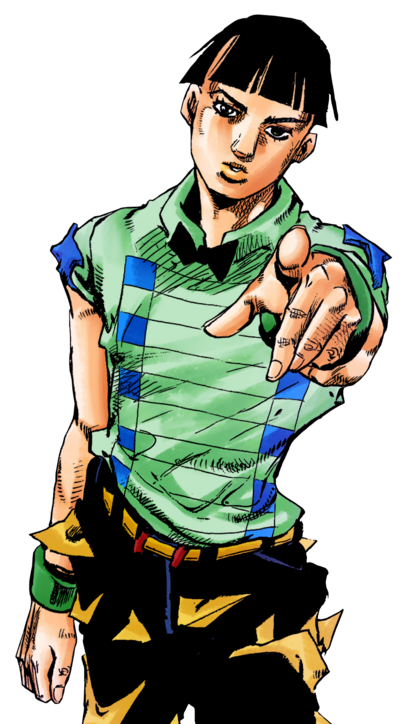
i so rarely hate characters, even ones that are meant to be disliked, because i usually appreciate their presence in the story and how fun it is to dislike them, but joshu.... joshu is another story entirely. so uh, challenge mode, here we go:
i think nut king call genuinely has a really interesting power and design
the way he's written makes it really clear just how much of him being Like That is a result of his messy family situation and intergenerational trauma, and i really appreciate the nuance to show that sometimes well-intentioned families can fuck their kids up
[PART 8 SPOILER] giving yasuho his arm was nice i guess, shame about the Entire Rest of that scene
#to me his crime is worse than just Being Unlikeable:#his crime is that i Don't Want To Read About Him#and therefore every minute he spends on screen is agonizing time i could be spending with any of the other far more fun characters#he commits the sin of Being A Bad Character In A Structural Sense#which is 10x worse than any morally reprehensible actions#like shut up joshu the adults are talking and im trying to follow the plot#you have nothing to contribute#go away#literally the ONLY character i can think of that i've Hated in a long time#anyways i tried very hard to be nice#like i Understand why he's like that and i think it's a well written choice#it's very clear araki knew what he was doing and both wrote him to be unlikeable On Purpose#and also showed that he's the result of the whole mess of his family situation#so he's not entirely unsympathetic#just. ugh.
8 notes
·
View notes
Text
Here’s something that would’ve been interesting for Boruto to be about: intergenerational conflict and resentment.
I’m sure the majority of people reading this at least know what I’m talking about, that being when older generations insult, degrade, and infantilize the younger generations. Boomers calling people snowflakes, people constantly mentioning the “tide pod challenge” to insult Gen Z, etc. It’s when older generations are resentful of children growing up in better times than them or when the different generations just don’t understand each other. This is already touched on a little in the Boruto series, but I’m talking about it being a major theme, so all of that conflict would be amped up to ten.
Granted, this wouldn’t work unless characters from Naruto that were already emotionally attached to are less than perfect parents (this is perfectly fine writing wise, even realistic, but I know a lot of people had problems with it). In fact, the Naruto characters, although not outright villains, would probably be similar to antagonists. Boruto’s generation would want to be taken seriously and be seen as ninja while the older generations would look at them like “kid, you haven’t been to war once and you’ve barely experienced conflict. you don’t know what the word ninja means.” Ideally, this would have a healthy mix of both sides of the conflict (like Naruto looking at Boruto’s screw-ups and becoming doubtful about leaving problems in his hands while Boruto feels like Naruto is magnifying minor mistakes).
I think this would work because:
It continues the theme of breaking the cycle of hatred through understanding because intergenerational resentment is a kind of cycle of hatred
The series would acknowledge that the Naruto characters went through a lot of trauma and screwed up things at a young age
The characters get to acknowledge all the crap they went through and get the chance to work through some of it on screen
It wouldn't be too far off from Boruto and Sarada’s desires to be treated as their own people rather than the son of Naruto and daughter of Sasuke
It would immediately give the next gen a shared relatable and sympathetic motivation
Naruto’s gen (or at least the most prevalent characters from it) could go through an arc about progressing the world without resentment and learning to accept that even without intense pain or trauma children can grow mature, competent adults. This could also play off of the idea of the will of fire.
#Boruto really did have so much potential#It just needed an author who had an idea going into it#boruto next generation#boruto#boruto two blue vortex#boruto naruto next generations#boruto rewrite#fixing boruto#Naruto sequel ideas#naruto next generation#boruto uzumaki#sarada uchiha
13 notes
·
View notes
Text
The Asian Drama Generational Trauma Challenge List

gif by @youdontloveme-yet
As @waitmyturtles has been making her way through her OGMMTVC I have been continuing to watch way too many dramas and thinking about the ones I want her to watch when she’s done with that project. And because I know Turtles, it’s always the dramas that feature themes around intergenerational trauma, filial piety, and lots of emotionally fraught interactions between parents and children that ping my “Turtles needs to watch this” radar. As I was mentioning the shows I wanted her to watch, Turtles joked that maybe I should make her a new challenge list that is focused on intergenerational trauma.
And if y’all haven’t learned this about me yet, you should know that I have no chill and absolutely will embark on a whole project because you make a stray comment in my direction. So here we are!
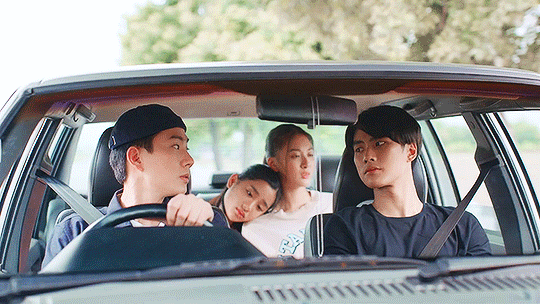
gif by @piningbisexuals
I wanted this list to be inclusive of a broad range of Asian dramas, exploring how it shows up in different Asian countries and through both het and queer lenses, so I consulted quite a few friends. Shoutout to @wen-kexing-apologist, @so-much-yet-to-learn, @bengiyo, @shortpplfedup, @ginnymoonbeam, and @emotionallychargedtowel for helping me refine this list. We landed on the following criteria:
Modern dramas only—not necessarily current but set in a time period recent enough that we don’t have a whole additional set of social mores to layer on top
The drama explores intergenerational trauma, not just intergenerational dynamics (so shows like Reply 1988 that are very much about family but not necessarily trauma are not on the list)
Intergenerational trauma is a primary focus and a major theme of the drama, not a background theme, a surprise reveal, or just part of a character’s backstory to engender sympathy (waves goodbye to most chaebol romcoms)
We are using the word trauma in a broad sense here–a lot of the complex trauma featured in these shows would not meet the formal DSM diagnostic criteria as a Traumatic Event
We did apply a quality filter–the execution of the story needs to be good enough that the intergenerational trauma themes stay intact, even if the drama overall is not a total slam dunk

gif by @gifetc
Note also that this list is not chronological and there is no suggested watch order. I also do not recommend binging all of these dramas one after the other. Some of these shows are heavy and you’ll want to space them out. This is a challenge to complete over time!
I decided to share this on tumblr in case others are similarly weird and wanted to undertake this challenge with us. If any of you see this and decide to watch some of these, please tag me with your progress and thoughts! I have also linked each show’s MDL page so you can see the synopsis and general warning tags, but if you want specific content warnings for any of these shows, feel free to comment or message me.
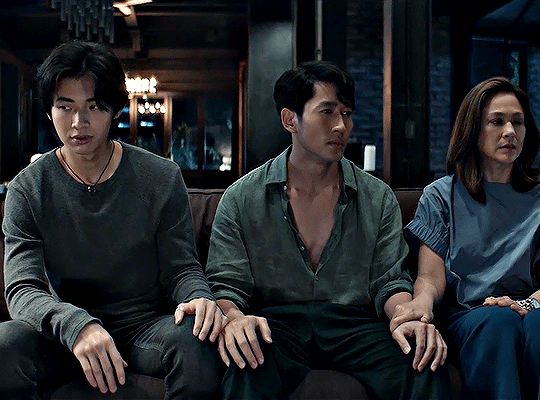
gif by @wanderlust-in-my-soul
So after a lot of preamble…
Generational Trauma Challenge List
10 Years Ticket (Thailand, YouTube)
180 Degrees Longitude Passes Through Us (Thailand, Gagaoolala)
About Youth (Taiwan, Gagaoolala)
Bad Buddy (Thailand, YouTube)
Come and Hug Me (S Korea, Viki)
Flower of Evil (S Korea, Netflix or Viki)
GAP (Thailand, YouTube)
Go Ahead (China, Viki)
It’s Okay to Not Be Okay (S Korea, Netflix)
Khun Chai (Thailand, YouTube)
My Mister (S Korea, Netflix)
Our Dining Table (Japan, Gagaoolala)
SKY Castle (S Korea, Netflix or Viki)
Something in the Rain (S Korea, Netflix or Viki)
Until We Meet Again (Thailand, Viki or YouTube)
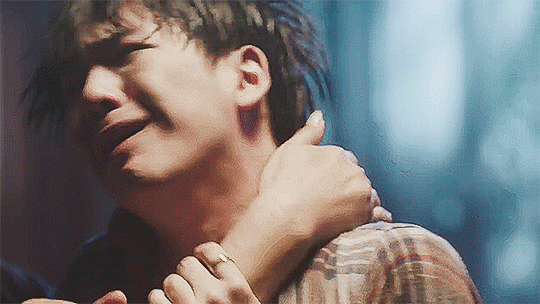
gif by @gabrielokun
Good luck, happy crying, stay hydrated, and please pace yourselves!
(Tagging friends @neuroticbookworm, @kyr-kun-chan, and @chickenstrangers who I have already discussed this with.)
#bad buddy#flower of evil#180 degree longitude passes through us#come and hug me#our dining table#until we meet again#gap the series#go ahead#it's okay not to be okay#khun chai#about youth#my mister#10 years ticket#sky castle#something in the rain#intergenerational trauma challenge#shan recommends
193 notes
·
View notes
Text
Turtles Catches Up With Old GMMTV: Until We Meet Again Edition
[What’s going on here? After joining Tumblr and discovering Thai BLs through KinnPorsche in 2022, I began watching GMMTV’s new offerings -- and realized that I had a lot of history to catch up on, to appreciate the more recent works that I was delving into. From tropes to BL frameworks, what we’re watching now hails from somewhere, and I’m learning about Thai BL's history through what I’m calling the Old GMMTV Challenge (OGMMTVC). Starting with recommendations from @absolutebl on their post regarding how GMMTV is correcting for its mistakes with its shows today, I’ve made an expansive list to get me through a condensed history of essential/classic/significant Thai BLs produced by GMMTV and many other BL studios. My watchlist, pasted below, lists what I’ve watched and what’s upcoming, along with the reviews I’ve written so far. In a LONG POST, I’m writing today about New Siwaj’s incomparable drama, Until We Meet Again.]
TW: suicide, suicidal ideation, psychological trauma
Gah. I am so psyched to be finally sitting down to write my thoughts on Until We Meet Again, but I’m actually at a bit of a loss on where to start. There is SO MUCH TO TALK ABOUT.
I think, where I can start, is to first say that this was, in my opinion, AN ABSOLUTELY SPECTACULAR SHOW. I did NOT expect this, at all. I’ve been around the way with New Siwaj, the UWMA screenwriter and director, a few times now for the OGMMTVC -- his writing on Love Sick, his work with Cheewin on Make It Right, and his work on MAME’s novel in Love By Chance have all been on the OGMMTVC list. I know that Between Us, the UMWA WinTeam continuation, was considered mostly a let-down for weak writing, and that New’s more recent shows, including A Boss and a Babe and Double Savage, were viewed quite critically (although I am a Double Savage apologist, for which I’ll explain my viewpoints later in this post).
So. What I did not expect from 2019′s UWMA was to experience so many layers in a drama à la the work of Aof Noppharnach. Yes, I cannot believe I’m going here, to compare a New Siwaj drama to Aof’s oeuvre, but damn if I will, because good lord, New took his magic hat of tricks, pulled out THE GOOD STUFF, and made it all work.
This is a list of themes that I saw in UWMA, that will help me structure this long write-up, but by no means should it be considered complete, as I’m sure I’m missing themes that you all likely caught in your watches and re-watches:
1) A new narrative structure for New -- balancing the impact of side couples by leveraging focus, equally, on two MAIN couples
2) The continuation and end of the 2019 trend of reincarnation and spiritual connections to love
3) Intergenerational queer trauma (micro-level)
4) Generational acceptance of queerness (macro-level)
5) Food and its Proustian effect on memory
6) Reflections on filial piety and the devastating effects of expectations -- and how children and parents seek redemption, particularly in New’s work
And before I even dive into THIS list, can I just say: MY GOD, FLUKE AND OHM. And Earth and Kao! But FLUKE AND OHM. Jesus, does New have an eye for talent -- from the Make It Right guys, to Perth and Saint, and then to Fluke and Ohm. I was seriously TAKEN with their chemistry. I did hear from a number of folks during my UWMA live-blogging that they can’t rewatch UWMA because of Fluke/Pharm’s rendition of the blushing maiden trope, but for my tastes -- I think the way he rendered the trope was really necessary to communicating Intouch’s story, history, and emotions, and just -- Fluke just ATE this role, my gawd. And Ohm/Dean responding in kind vis à vis Korn’s regret. YOW. It’s been a few days since I finished the show, in a total RUSH of drama hunger, and I’m still shaking my head and MARVELING at their performance.
Okay, back to the themes list. So, early in my Thai BL journey in the fall of 2022, after I had watched KinnPorsche and The Eclipse as my first two Thai BLs, I watched A Tale of Thousand Stars (way before the OGMMTVC was born), and noted that I appreciated the lack of side couples in the ATOTS storyline. I now realize, through the OGMMTVC, that side couples are both a BL trope and a byproduct of the drama styles from which BLs were born, the ensemble-based dramas like Love Sick, Senior Secret Love, and Kiss/Kiss Me Again.
New’s Make It Right -- while beloved in my heart, for the chaotic duos of TeeFuse and FrameBook -- WAS messy, with all the other couple stuff happening around it. That, along with Love By Chance, made me wonder -- why do BLs that center fabulous dyads with sizzling chemistry take away from that energy with all the side couple action? Even Together With Me, a non-New Siwaj and non-GMMTV drama, got sidelined in part with a VERY questionable side couple plot in BrightFarm.
Reflecting back on KP and The Eclipse, I had that question in mind as I started UWMA, and wondered where the Alex and WinTeam storylines were going to go. But, frankly, I ended up appreciating what NEEDED to happen with DeanPharm and KornIntouch, because -- the original novel storyline clearly demanded that these two couples, who were NOT side couples, but MAIN couples, needed a MAIN spotlight for their collective story to be told. @clairificusrex mentioned in a liveblog comment (THANK YOU, LOVELY HUMAN!) that New Siwaj benefitted in the screenplay from having a wonderful original novel to work with, and while I don’t read Y Series canon, I can only imagine that this was indeed the case.
So, New, in order to hew to the novel, had to perhaps hold back his usual instincts to muss up the main couple vibe, by centering DeanPharm and KornIntouch. With that control necessary to the story -- I think the narrative STRUCTURE of the drama just blew open. It was FASCINATING, it drew me in, and the structure allowed for another New predilection to be leveraged WELL, in his love for flashbacks. @lurkingshan, you mentioned that your taste wasn’t necessarily aligned with New’s fancy for flashbacks, which I totally understand -- I think flashbacks hurt the overall narrative structure of Double Savage earlier this year. But I think, here for UMWA, they were necessary, and I might very well be apologetic to that considering what I DID see in Double Savage by way of the story that New ended up screenwriting over there in regards to intergenerational family trauma (again, more on this later in the post).
This narrative structure lent itself handily to the next four themes on this list, all of which deal in memory, in spiritual roots, and/or in the generational passage and inheritance of trauma and emotion. 2019, as we know now, was a big year for shows themed around Thai spiritual culture and/or reincarnation. We have He’s Coming To Me, we have Dew the Movie -- we have art here, queer-centered art, that does not lend itself to happy endings, that depicts, through reincarnation or, in the case of HCTM, a ghostly purgatory, how DIFFICULT it had been to be comfortably queer and/or openly out in past and present Thailand.
And then UWMA comes along, telling TWO generational stories, intertwined by the red thread, but also, in the words of the WONDERFUL @bengiyo, connected by Korn and Intouch’s intergenerational queer trauma, the most PERFECT coinage of a theme for this show. In 1988, when Korn and Intouch die, they cannot be out. They cannot even be SECRETLY in love. Their bad dads use the foulest of language to describe their love (much like Phop’s dad in Dew). And Korn kills himself, and Intouch follows.
And what we learn, through Dean and Pharm, are the emotions, the regrets, the LEARNED BEHAVIOR that Korn and Intouch have picked up on in the afterlife, embedded in Dean and Pharm, that keeps Korn and Intouch’s love alive, with CORRECTIONS and ADJUSTMENTS made by Dean and Pharm that reflect on how not only Korn and Intouch’s love has changed and improved, but also how Dean and Pharm are learning how to love EACH OTHER, themselves, as they adjust to their OWN belonging to each other, in Pharm’s own words. GAH -- my aching heart. (Thank you to @lurkingshan for talking this through with me early on in my UWMA watch.)
I mean. THE DEPTH OF THIS. Intouch is a terrible cook, and Pharm is like, a restaurant-level chef?! Pharm is so resistant, and Dean is so FORWARD? (OHM THITIWAT, GAH!!!) (Listen. Pharm. P’Deeeean can grab MY butt, okay?) (See what I did there, @lurkingshan and @bengiyo? THANK YOOOOUU.)
And Pharm’s blushing maiden approach. Yes, I will also admit, that sometimes, it was a little cringey. But I think the blushing maiden trope was really necessary to the story -- ESPECIALLY IN THE CONTEXT of Intouch’s anger, ciphered through Pharm in the last episode. And I think that Fluke Natouch ultimately rendered the trope beautifully -- again, especially against the gorgeous ending of the show. Oh, THAT CONDO SCENE, PEOPLE. I LOST IT.
Of course, Intouch would want to hold back through Pharm in the present day. If Intouch DIDN’T hold back vis à vis Pharm -- he might lose Korn again, if Pharm missteps with Dean. Intouch may have felt that HIS forwardness lent to their troubles -- so Intouch holds back, through Pharm. And Intouch ultimately communicates his love for Korn differently in the afterlife, more hesitantly -- through a resistance to intimacy, and through food and cooking in Pharm, which itself was another amazing move in this show.
Listen. Even my pinned post says what I value in dramas, not just in BLs. You give me food in BL, and I give you my heart. But also, let’s talk about the meaning of food in Asian dramas for a second. It’s no coincidence that MANY Asian dramas and doramas center food, including my favorite BL of all time, Kinou Nani Tabeta/What Did You Eat Yesterday?. If you don’t know Asians, of any ilk -- let me make a BROAD continental and sub-continental judgement. ALL WE THINK ABOUT IS FOOD, lol. While I’m with my family, while I’m working, while I’m writing meta -- I’m thinking about food, I’m thinking about what I want to cook, what I want to order, how I can mix the cuisines I love (Thai-Indian curries, anyone? YUM). Malaysians literally boast about having multiple meals, way past three meals, a day. We Asians are proud of our cuisines, and we want y’all to be EATING, A LOT, and to try all our dishes. (ITSAY, your Hokkien mee is calling me...)
But, also: FOOD MEANS FAMILY. Let me say it again: FOOD MEANS FAMILY. You FEED the people you LOVE, with delicious food. Shiro and Kenji. Kurosawa and Adachi. The guys in Jack o’Frost. The guys in The Eighth Sense. Omg, even Kinn and Porsche. We’re seeing it in Tokyo In April Is... And Pharm, to Dean, Intouch to Korn.
And BESIDES Intouch/Pharm becoming a great cook, GOD, the story ALSO INCLUDED the Proustian reference of the madeleine and involuntary memory -- but in SUCH a stunning way, as to RECALL DEAN’S FAMILIAL MEMORY of eating his grandmother’s Thai desserts -- his grandmother, Intouch’s sister, and how Dean could get an indirect spotlight into Intouch and a depth of an understanding of Intouch’s happiness besides his love for Korn. And how Pharm EMBODIED that love for Thai desserts through Intouch’s family lineage. Oh, just get me MESSY, PEOPLE. FUCKING GENIUS SHIT.
Memory on memory on memory. Dream on dream, nightmare on nightmare, tears and red threads, inherited trauma, intergenerational trauma. The micro-level of what Dean and Pharm had to live with on a daily basis in their recollections of Korn and Intouch. The macro-level of what Pharm and Dean experienced when all of their parents accepted them for who they were as queer individuals, and their partners, as well. How Dean’s dad could ACTUALLY RELATE to Dean himself, because Dean’s dad had been rejected by Dean’s mother’s family. And how that ALLOWED Dean’s dad to accept Dean and his choice to be with Pharm. How that trauma was relieved, how Dean and Pharm DID NOT HAVE TO PHYSICALLY RELIVE what Korn and Intouch had gone through, and how those involuntary memories that Dean and Pharm carried vis à vis Korn and Intouch traumatized them until Dean and Pharm could RECEIVE their OWN familial acceptance.
The LAYERS OF THIS SHOW. Before I get to the last theme on my list, I really just need to metaphorically slam my palms on an allegorical table and give New Siwaj a huge hug, because THIS SHIT IS NOT EASY TO PROCESS ALL AT ONCE, and I can’t wait to do a UWMA rewatch to try to catch more (and I’ll likely need to write another meta, ha, when I do that). I mean, again, just to use food as an example of a kind of storytelling TOOL to INDICATE memory, especially in the context of lost and found love, of intergenerational trauma and relieving regret -- BRILLIANT. BRILLIANT.
And. The last theme on the list, the theme of filial piety, of Asian family systems and devotion and loyalty and expectations, and the devastating effects on the micro-individual level (and even the macro-social level as well) that those expectations can have.
So, I watched Double Savage, screenwritten by New Siwaj, out of order from UWMA. Very quickly, since many of you have likely NOT watched Double Savage because it’s not a BL (but it DID have Ohm Pawat and Perth Tanapon in a hose-off scene -- you can’t take the New Siwaj out of New Siwaj, amirite): Double Savage is about Korn (Ohm P.), a middle son who is branded a jinx by a HORRENDOUS Thai-Chinese father, and how the abuse leveled on Korn by his dad has intergenerational ripple effects across their family and community.
Let’s break this down. I now know that New Siwaj does bad dads from Thai-Chinese lineage very well. UWMA’s Korn is expected to take over a mafia business. His dad is disapproving that Korn doesn’t want to take over the business -- which is an UNQUESTIONABLE and EMBEDDED expectation in most Asian family lineages (hello, Jeng and Step By Step) -- AND Korn’s dad is ALSO disapproving in Korn’s love for Intouch and vice versa. Separately, Intouch’s dad is disapproving that Intouch is in love with Korn, a mafia scion.
Modern times are modern for a reason. 1988 was 31 years from 2019. I want to emphasize here the understanding that Korn and Intouch likely had -- that besides running away, there was no other existence for them to be together than to kill themselves and be together in the afterlife. And running away, and still living and existing, would have been a guilt-ridden and dangerous existence, for what Asian children are expected to do and live for vis à vis their parents. Korn likely HAD NO OTHER IMAGINATION for a life that he could live OTHER THAN to take over his father’s business and to be a heteronormative adult in the late 1980s. And, to top that all off, both of their dads were fucking assholes.
I really liked how this was juxtaposed to the relationship between Dean and his father. Dean was clearly set up to be as stubborn as his dad. Meaning, at least to me -- that Dean was FAR less likely to be told what to do by his dad, that Dean would and maybe COULD, stand up to his dad. We didn’t see it happen, but I could have imagined Dean not accepting “no” for an answer from his dad to accept Pharm. (Makes you think about Pat, Pran, and Ming, no?) Dean had Korn in him. Dean/Korn was NOT GOING TO TAKE THAT SHIT AGAIN, and that was CLEAR. I want to emphasize: THAT’S BIG. That was BIG on New Siwaj and the UWMA novel writer to include that in the story. That’s parental defiance. That needed to happen in order for Dean and Pharm to survive. As an Asian, that gives me a kick of welcome energy.
But I also really want to note what New Siwaj did at the end of the show, something so deft, it might have left non-Asian viewers wondering what was going on. In the condo scene, Dean and Pharm are ciphering Korn and Intouch -- and when Korn’s father shows up in the wheelchair, Korn’s father knows what’s happening.
And Korn apologizes to his dad. Korn had already apologized to Intouch, but Korn also apologizes to his dad, and to his brother, and to his nephew in Sin. This really gets me, y’all, I understand this as an Asian. Korn is APOLOGIZING for the PAIN he caused in his family AND in Intouch, because -- filial piety. He knows what he did to himself was devastating to the Asian family system he was born into, to the Asian society he was born into, and he apologized for the suicide he committed unto himself that caused that extra-social pain.
Like. As crazy as that sounds, it’s also an INCREDIBLY SOPHISTICATED way to ACKNOWLEDGE that Korn had broached a social boundary, and Intouch had followed him. THAT IS A HELL OF A LAYER TO ADD TO THIS STORY, ONE THAT I DID NOT EXPECT, and that SHOOK ME at the end of this series.
A similar situation happened in Double Savage. Despite the horrendous psychological abuse that Double Savage’s Korn received from his father -- an adult Korn ends up apologizing to his father for the trouble that HE may have caused. Now, what I appreciated about Double Savage was that THAT dad was like -- no, no, *I* should be the one apologizing. BUT, I want to indicate and emphasize here, that BOTH storylines acknowledge that Asian children NEED to know, SHOULD know, ARE BORN TO KNOW, that their actions have collective effects on a wider family system. We are born to understand and think like that. We are not dealing with an individualist Western perspective here. (I literally FLIPPED when I realized that New Siwaj has had MULTIPLE CHARACTERS NAMED KORN APOLOGIZING TO BAD DADS, and I’m an Asian over here UNDERSTANDING WHY, and I’m just like, pfffftt GGGAAAHHHH.)
Why am I harping on this? BECAUSE: vis à vis EVERYTHING ELSE that is lineage-based in this story -- from children being born, to intergenerational trauma, to reincarnation -- UWMA is structured around an über-macro theme of worlds being linked, by threads, by genes, by history, by spirit, by trauma. We are collectively linked. Babies are born -- we saw many babies in this show. Children belong to families. Lovers belong to lovers. Dean PHYSICALLY belongs to Intouch’s family, and Pharm to Korn’s family. A happy existence will be when a family accepts a child’s partner. Happiness is in a family growing, not a family shrinking. Warmth and growth and love happens when a happy family sits at a table and eats together.
As Pharm says at the end of the show -- oh, my HEART -- “I belong to Dean.” Yes, you do -- because you have become Dean’s family, and Dean has become Pharm’s family. Korn’s family BELONGS to Intouch’s family, and vice versa. They are destined, MEANT to be linked together, AND TO BE FAMILY, ALL TOGETHER.
Kurosawa and Adachi become family in the Cherry Magic movie. WDYEY’s Shiro and Kenji become family by way of living and eating together. Even if BBS’s Ming doesn’t acknowledge Pran -- Pran is Ming’s family. LOVE. MAKES. FAMILY.
What Korn apologized for was the impact his decision had on his family — WHILE HE WAS IN LOVE WITH INTOUCH, WHO KORN’S FAMILY WAS NOT ALLOWING KORN TO MAKE AS KORN’S NEW FAMILY in the 1980s. Korn was able to apologize in the afterlife — BECAUSE Dean and Pharm DID WHAT HE AND INTOUCH COULD NOT DO, by way of generations, by way of family acceptance, by way of inherited trauma and STOPPING that inherited trauma in its tracks -- very much like Pat and Pran banding together and doing the same for themselves. Dean and Pharm did the hard work of making the relationship a real one, in every aspect of their intimate, micro-level family lives, to a public, external existence in the world. Korn could FINALLY experience the release of GUILT he had towards Intouch and towards Korn’s family, now that Korn’s love for Intouch could FINALLY flourish outside the constraints of filial piety through Dean. THIS IS HUGE. I have no words to tell you what the BRILLIANCE of this means to me as an Asian. LOVE MAKES FAMILY, and LOVE THAT IS ALLOWED TO FLOURISH GIVES YOU THE RELEASE TO BE YOUR TRUE SELF.
Dean had learned from the inherited trauma that he got from Korn that he needed to stop the trauma train in his tracks, and he did, and he confronted his father, and his father blessed the union of Dean and Pharm. When Dean took the gun away from Pharm, and embraced Pharm, Korn and Intouch KNEW that they could finally be safe in the afterlife. Dean and Pharm were the ciphers that finally ALLOWED Korn and Intouch to exist happily together in spirit. Korn, especially, could exist freely, now that he was relieved of his guilt. Dean and Pharm were, LITERALLY, Korn and Intouch’s FAMILY -- the FAMILY that ALLOWED the FINAL RELEASE for Korn and Intouch to be together as their true selves and spirits.
And Dean and Pharm confirmed that in FRONT of the family member, in Korn’s father, that had originally caused all this pain. The intricate layers, communicated to a primarily Asian audience, of Korn apologizing to his father, and then of Dean embracing Pharm and confirming their love AND Korn and Intouch’s love, in front of that former barrier -- that is GROWTH and FLOURISHING in the face of generational defiance, and about as sophisticated and eloquent a communication of familial transcendence as I could possibly imagine seeing in Asian drama art. WHOA. I’m a little out of breath with this.
Wow. And speaking of being one’s true self: I deeply loved that Dean and Pharm took a three-month break. I loved that Pharm was smart and strong enough to demand a break to understand if DEAN and PHARM -- INDEPENDENT of ANYTHING they had INHERITED from ANYONE -- actually loved each other and belonged together. Fuck. Pharm was like, no -- this one’s on me. I need to see, outside of ANY INFLUENCES, FROM ANYONE, ANYWHERE -- if I love Dean, if Dean loves me, and if we belong together. Brave. Badass.
AND, I truly loved how Korn and Intouch -- DEAN AND PHARM’S FAMILY -- came BACK to Dean and Pharm’s dreams to offer thanks. I loved how, in the end, the past and his family came back to give Pharm that little contextual nudge to say to Pharm, it’s okay to love Dean for Dean, AND to love how you two came together, through Korn and Intouch. And Pharm could acknowledge, finally, that he belonged to Dean. God damn.
This story was so multilayered, SO complex, SO filled with a respect for love at its highest and most complicated levels. This story was filled with CRITICAL SCRUTINY towards Asian family systems and the trauma that those systems can render. This story was filled with an acknowledgement for the power of LOVE that those same family systems can offer unto children who NEED pillars of love and support (Pharm’s mom and brother, badasses!).
Y’ALL. I just, I DID NOT KNOW that New Siwaj could DO THIS! I know that UWMA is considered his best show, but like, this is his best show BY A LOT, A LOT. Double Savage, in contrast, had a lot of narrative and structural issues that detracted from the core stories of filial piety that were ultimately very important to tell.
UWMA did not fall into that trap. It was SMART, it MOVED (FOR SEVENTEEN EPISODES! I SLAMMED THIS SERIES! I could have watched MORE, I cannot believe I’m SAYING THAT!), it was. It was just BRILLIANT. It was an ode to romantic love, to family love, to the power of memory. In 2019, it joined He’s Coming To Me in a burgeoning echelon of cinema-influenced BLs in storytelling, soon to be joined by I Told Sunset About You, ATOTS, and others. It took the sad endings of He’s Coming To Me and Dew the Movie and said -- not today. Today, we will let love LIVE, let QUEER LOVE live, in REAL LIFE, in REAL TIME, and we will not let our lovers live in regret. We will take queer love, we will give queer love FAMILY, and we will give it the HONOR IT DESERVES.
Until We Meet Again is a must-watch of the highest order, and goes on the shortlist of shows that I will refer to as one that makes me proud to be an Asian. It was easily one of the most important shows I’ve watched in this project. All credit to New, Fluke, Ohm, Earth, and Kao for a PHENOMENAL experience -- my heart and mind have been bettered because of this show.
[FLUKE. AND. OHM. Fluke and Singto coming thru in Shadow the Series? Sign me the FUCK up. Actors on actors. WOW. Did UWMA ever introduce me to another crop of dudes who can fucking tear up a screen. I had SO much fun watching UWMA, whew!
And, yep. I had to follow this up with 2gether, ha. I’m going to spare myself a little pain, if y’all don’t mind, and combine my write-up of 2gether with Still 2gether. I know there’s a lot to be said about the lack of intimacy in 2G, which I can’t wait to dive into, but I can’t help but to also run into another wall of analysis with dear P’Aof’s work in S2G. I’ll make it all work!
After I get myself together with 2gether (HA) -- it’s ITSAY time. I will be planning on watching ITSAY TWICE before writing, as I’m preparing myself to catch EVERYTHING I can before I pen words. Stay tuned.
Status of the list below. As always -- if you have feedback, send it my way!
1) Love Sick and Love Sick 2 (2014 and 2015) (review here)
2) Make It Right (2016) (review here)
3) SOTUS (2016-2017) (review here)
4) Make It Right 2 (2017) (review here)
5) Together With Me (2017) (review here)
6) SOTUS S/Our Skyy x SOTUS (2017-2018) (review here)
7) Love By Chance (2018) (review here)
8) Kiss Me Again: PeteKao cuts (2018) (no review)
9) He’s Coming To Me (2019) (review here)
10) Dark Blue Kiss (2019) and Our Skyy x Kiss Me Again (2018) (review here)
11) TharnType (2019-2020) (review here)
12) Senior Secret Love: Puppy Honey (BL cuts) (2016 and 2017) (I’m watching this out of order just to get familiar with OffGun before Theory of Love -- will likely not review)
13) Theory of Love (2019) (review here)
14) 3 Will Be Free (2019) (not a BL or an official part of the OGMMTVC watchlist, but an important harbinger of things to come in 2019 and beyond re: Jojo Tichakorn pushing queer content in non-BLs) (review here)
15) Dew the Movie (2019) (review here)
16) Until We Meet Again (2019-2020)
17) 2gether (2020) and Still 2gether (2020) (watching)
18) I Told Sunset About You (2020)
19) YYY (2020, out of chronological order)
20) Manner of Death (2020-2021) (not a true BL, but a MaxTul queer/gay romance set within a genre-based show that likely influenced Not Me and KinnPorsche)
21) A Tale of Thousand Stars (2021) (review here)
22) A Tale of Thousand Stars (2021) OGMMTVC Fastest Rewatch Known To Humankind For The Sake Of Rewatching Our Skyy 2 x BBS x ATOTS
23) Lovely Writer (2021)
24) Last Twilight in Phuket (2021) (the mini-special before IPYTM)
25) I Promised You the Moon (2021)
26) Not Me (2021-2022)
27) Bad Buddy (2021-2022) (thesis here)
28) Bad Buddy (2021-2022) and Our Skyy 2 x BBS x ATOTS (2023) OGMMTVC Rewatch
29) Secret Crush On You (2022) [watching for Cheewin’s trajectory of studying queer joy from Make It Right (high school), to SCOY (college), to Bed Friend (working adults)]
30) KinnPorsche (2022) (tag here)
31) KinnPorsche (2022) OGMMTVC Fastest Rewatch Known To Humankind For The Sake of Re-Analyzing the KP Cultural Zeitgeist
32) The Eclipse (2022) (tag here)
33) GAP (2022-2023) (Thailand’s first GL)
34) My School President (2022-2023) and Our Skyy 2 x My School President (2023)
35) Moonlight Chicken (2023) (tag here)
36) Bed Friend (2023) (tag here) (Cheewin’s latest show, depicting a queer joy journey among working adults)]
#until we meet again#until we meet again meta#uwma#uwma meta#ohm thitiwat#fluke natouch#deanpharm#dean x pharm#pharm x dean#kornintouch#korn x intouch#intouch x korn#earthkao#kao noppakao#earth katsamonnat#ohmfluke#new siwaj#double savage#double savage meta#ohm pawat#perth tanapon#ohmperth#turtles catches up with old gmmtv#turtles catches up with thai BLs#turtles catches up with the essential BLs#the old gmmtv challenge#ogmmtvc#asian family systems#asian family dynamics#intergenerational trauma
92 notes
·
View notes
Text
okay, so we’d like to talk a bit about transrace and transrace discourse
please note that we are a white system. it is our goal to speak up for (not on behalf of) and uplift (not silence or speak over) marginalized voices however we can. it’s always better to center poc voices when discussing something that directly affects them. so if any poc reads this and finds it offensive/wants us to change something, please get in touch!!
what is transrace?
the terms “transrace” and “transracial” have existed for decades outside the scope of tumblr discourse. they refer specifically to adoptees whose race differs from that of their adoptive parents. transracial individuals face unique challenges due to their racial identities differing from that of their adoptive parents. having the language to describe themselves gives these people the opportunity to vocalize their struggles and draw attention to the issues they face.
we ourselves are not transracial, but we have a younger sibling who is. we’ve witnessed her struggles growing up as a Black child in a white family, and she deserves to have the language to talk about her experience. she does not deserve to have the language coined to help her understand herself and others like her co-opted by radqueers on the internet.
what is the radqueer meaning of “transrace?”
transrace, or trace, according to many radqueers means identifying as a race that differs from the biological race of the body.
it’s worth noting that some supporters of transrace are pushing to call it “trace” as a way to separate themselves from those with actual transracial identities. however, it’s implied that the t in “trace” stands for “trans,” so it’s really not that much different (nor any less offensive) than the transrace term.
how or why is “transrace” harmful?
claiming to be a race that differs from the body’s biological race is, in fact, racist, despite otherwise claims. it is cultural appropriation under the guise of “cultural appreciation.” it is taking the experiences, struggles, and joys of a marginalized group that you are not apart of, and co-opting them to try and make them your own. it perpetuates racist and transphobic stereotypes and disrespects people of color.
but don’t take our word for it! here are some sources by journalists and people of color explaining why transrace/trace as a concept directly harms non-white people.
x x x
the transrace/trace movement also fails to understand race as it is and how it works in the world today and throughout history. race is a social construct, true, but it is more tied to biology and affected by intergenerational trauma than gender or sexuality. race is determined more by the society in which an individual lives and their family’s generational history than any individual desires or choices that person may have or make.
what if i’m disabled or neurodivergent?
it’s still racist, sorry. it is quite possible for disabled people to be racist, as it is possible for marginalized groups to be bigoted towards others from different marginalized backgrounds. being marginalized does not excuse you from being able to be held accountable for your actions and choices.
what if i’m an alter in a system?
this doesn’t change the fact that identifying as trace is racist. if you are an alter who views yourself as a different race from the body, it becomes your responsibility to unlearn your internalized racism, understand how your biology and environment affect you, and ultimately realize that race has external factors that either grant or deny you privilege.
what if i’m biologically a person of color and i’m white transrace?
if that is the case, we’d ask you to genuinely ask yourself why you feel this way. is it due to racial trauma, or witnessing racism in the past? is it because people of color are far more likely to be impoverished or underprivileged than white people? is it because you feel other people of color are treated less fairly than white people? if any of this is the case, we strongly recommend you ask yourself if racism is at the root of your feelings. no amount of identifying as a different race will help you be able to reap the benefits or privileges that come with being born white. in fact, identifying as transrace/trace will only further perpetuate the harmful stigmas and stereotypes that surround race in the world today.
where can i learn more about race and combatting racism?
please consider (especially if you’re white!!) reading the book how to be an antiracist by ibram x. kendi. this book defines race and discusses racism in depth, along with ways average people can work to combat racism every day. you can also check out pbs’ educational series on race and racism, the netflix documentary 13th, or search out poc content creators who are advocating for fellow poc and educating about racism, its history, and how it affects people today. if at all possible, see if you can take a race and ethnicity course at a local college or university. ask questions, keep an open mind, and foster within yourself a willingness to change for the better.
especially if you’re white, unlearning racism is a lifelong endeavor. it involves making personal lifestyle changes, questioning your own thoughts and actions, and calling out the racist words and actions of others. rather than getting discouraged and giving up on trying, it’s important to try to do the work of unlearning bigotry to the best of your ability. it won’t happen overnight, but accepting the fact that change needs to happen is a great first step.
thank you so much for reading. stay well, and take care.
28 notes
·
View notes
Text
Thanks for the tag, @deanwax. I like this one even though this is definitely an exercise in which I stare into the abyss and the abyss stares back lol.
___
Thumbprint Challenge
RULES: look back on your work, both past and present, finished and unfinished. what are five to ten narrative elements or tropes that continuously pop up in your work? give a list of these things!
The dark side of human nature (ala Heart of Darkness or Lord of the Flies)
The banality of evil
Bad things happening to good people
Living with traumatic experiences up to and including CPTSD and how it complicates relationships
Trauma bonding
Family building, through found family, pregnancy, and adoption - and the intergenerational senses of identity
Sexual liberation and claiming sexual autonomy after opression or abuse
Toxic parenting and adultism (often with just a sprinkle of religious trauma, for flavor)
The upheaval of life as the MC knows it - the end of the world, liberarion, trauma, catastrophe, etc. The Tower, if you know tarot.
Gentle tag to @anoelleart, @andromeda-grace, @paintedbutton, @winterandwords, @athensoddcollections, @words-after-midnight, and open to anyone else
12 notes
·
View notes
Note
I really really wish more culturally christian atheists who get upset with the label would sit in the cognitive dissonance and try and work through why they're so upset by it, beyond simply being associated with something they dislike. Challenging enculturated beliefs and acknowledging that you too are subject to enculturation in society isn't an easy feat, but it's important to question how your views and assumptions are formed, and unpack that shit.
exactly. and honestly it gets really frustrating bc it feels like a lot of them think that their trauma should be prioritized over the trauma of religious minorities who are trying to talk about this. like they're allowed to lash out because christianity hurt them, they're allowed to make assumptions and refuse to examine their biases, but we have to censor ourselves and make sure every word we say is meticulously chosen to placate them in hopes that maybe they'll listen to us. idk. it's a shitty situation for all involved, absolutely, but it sometimes feels like we are expected to take the high road when we're often the ones who are struggling with personal, intergenerational, and communal trauma.
39 notes
·
View notes